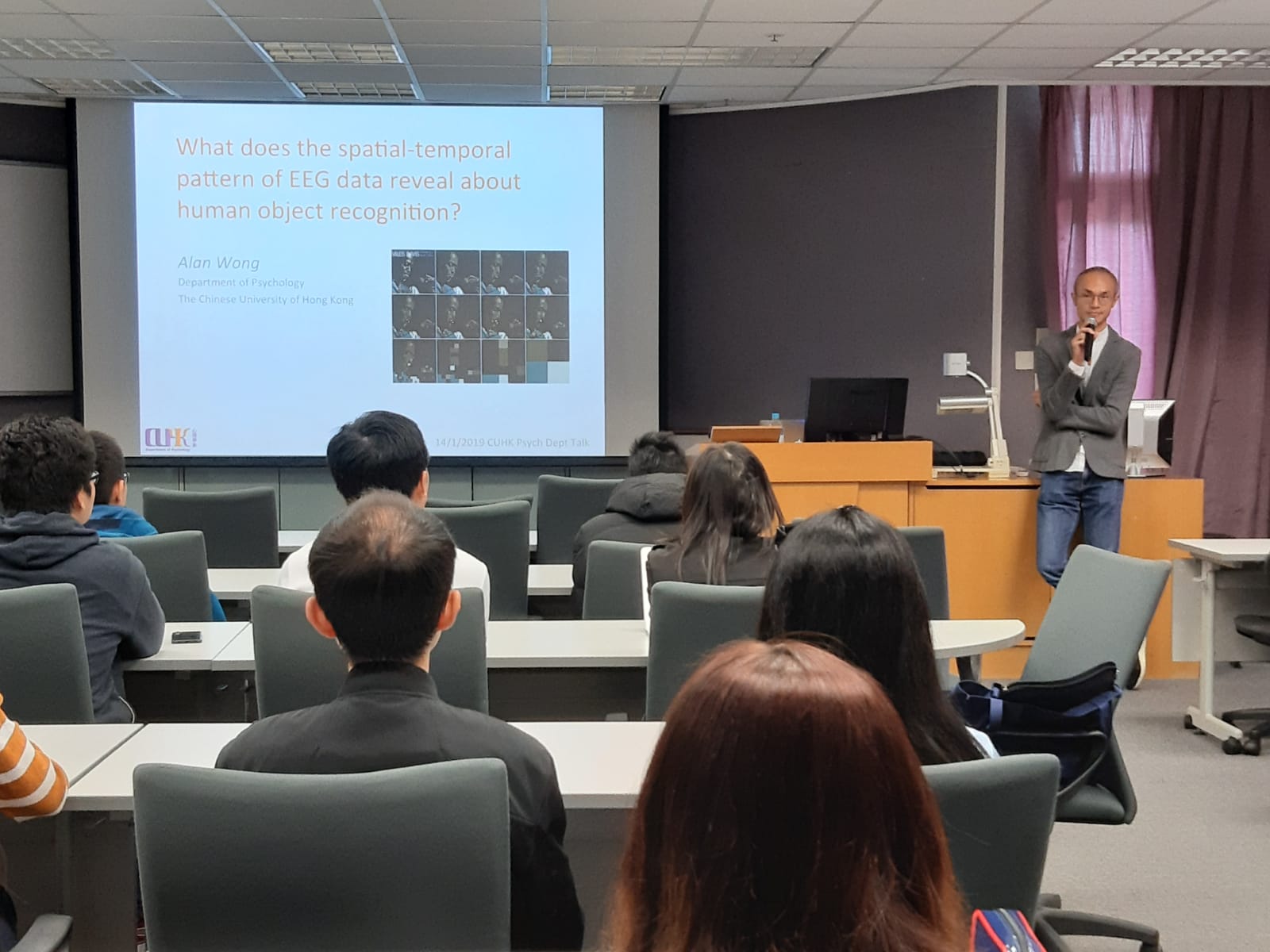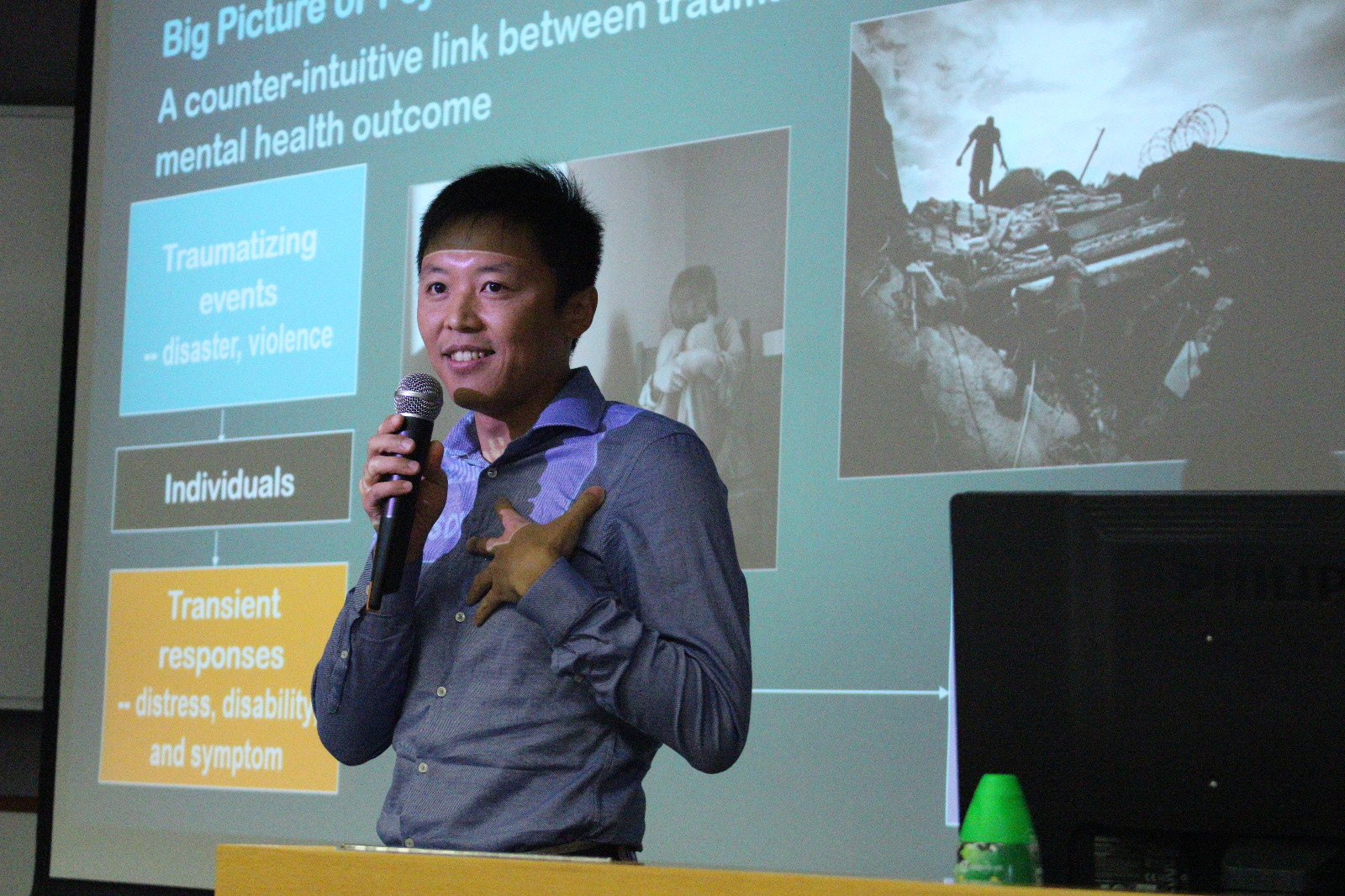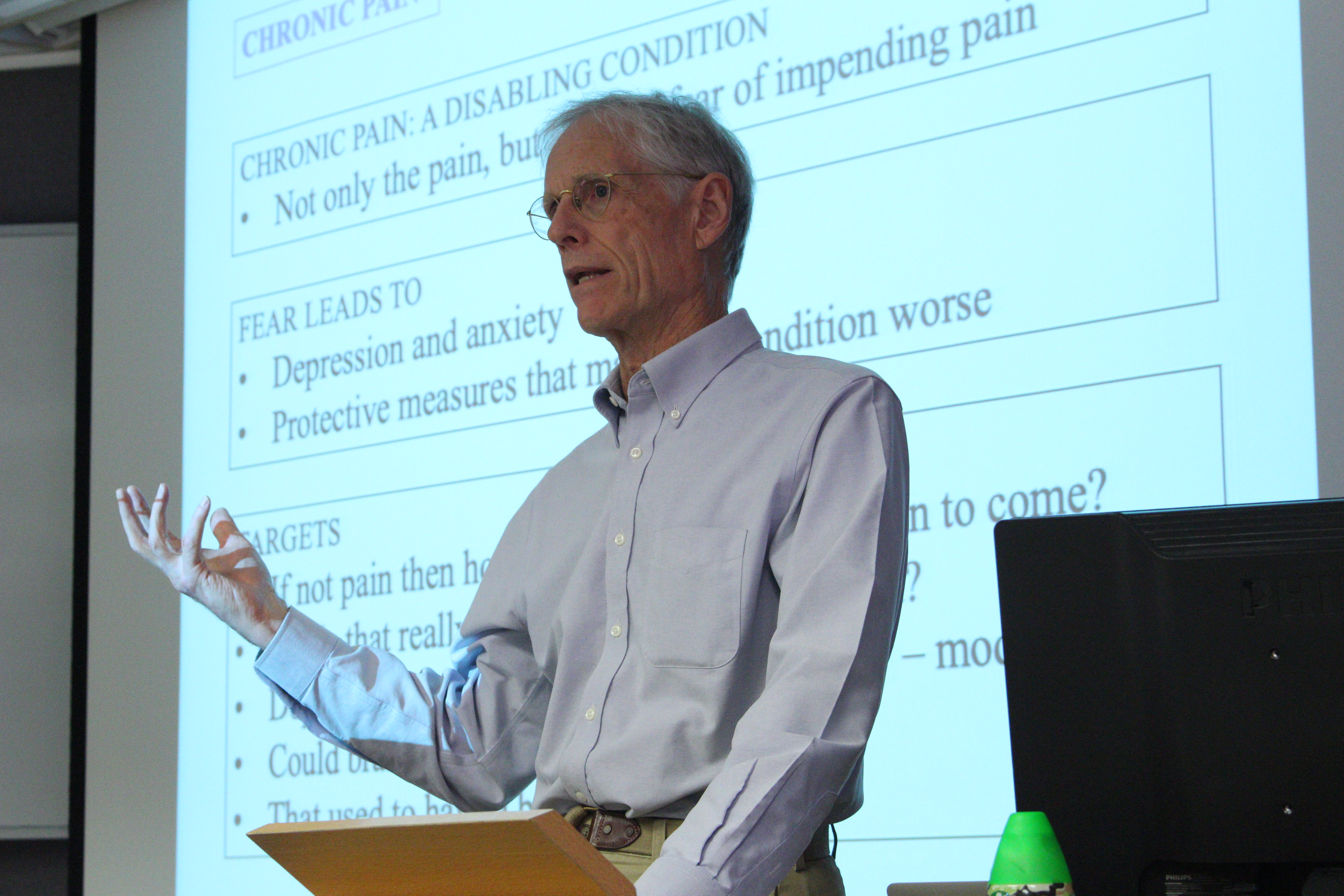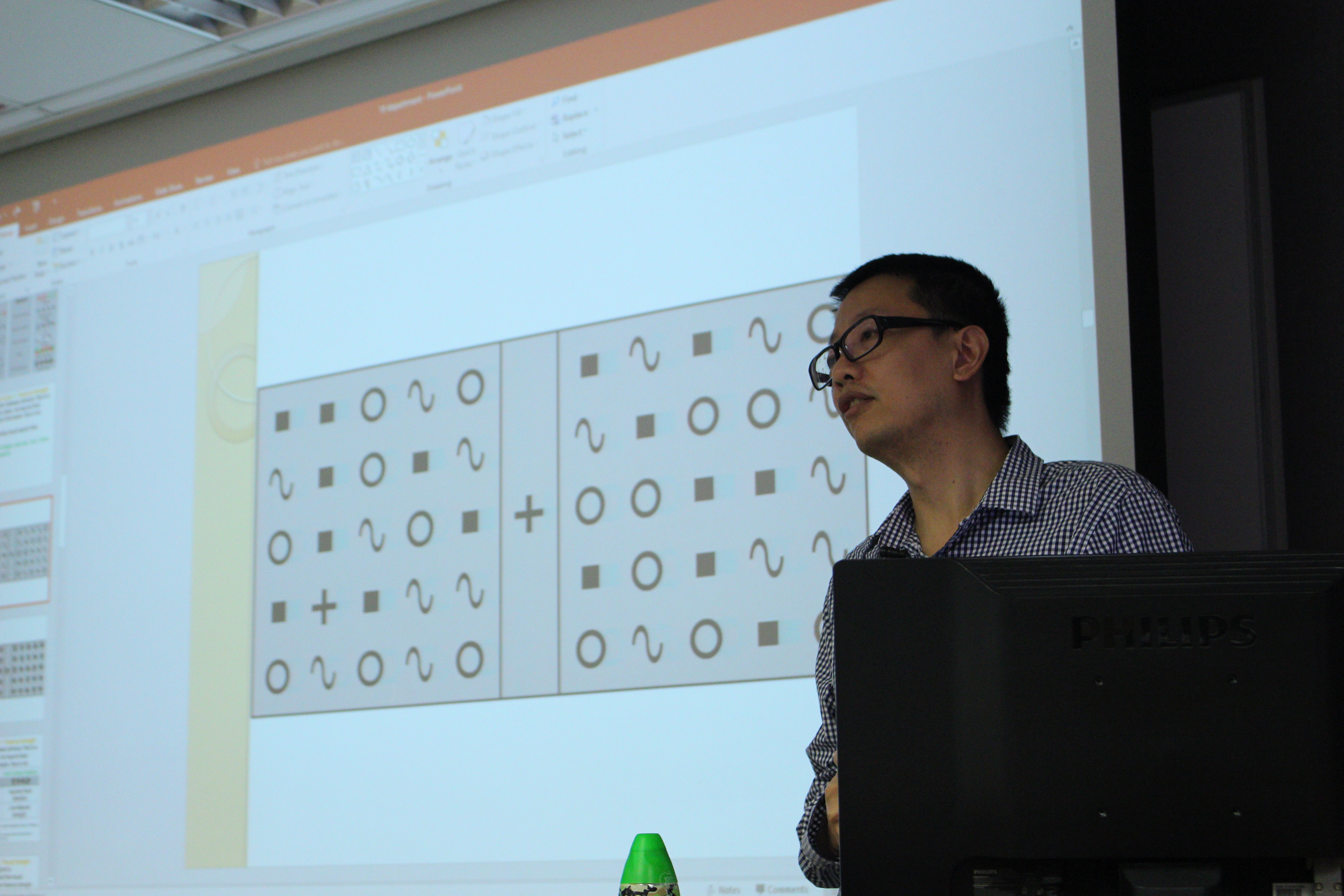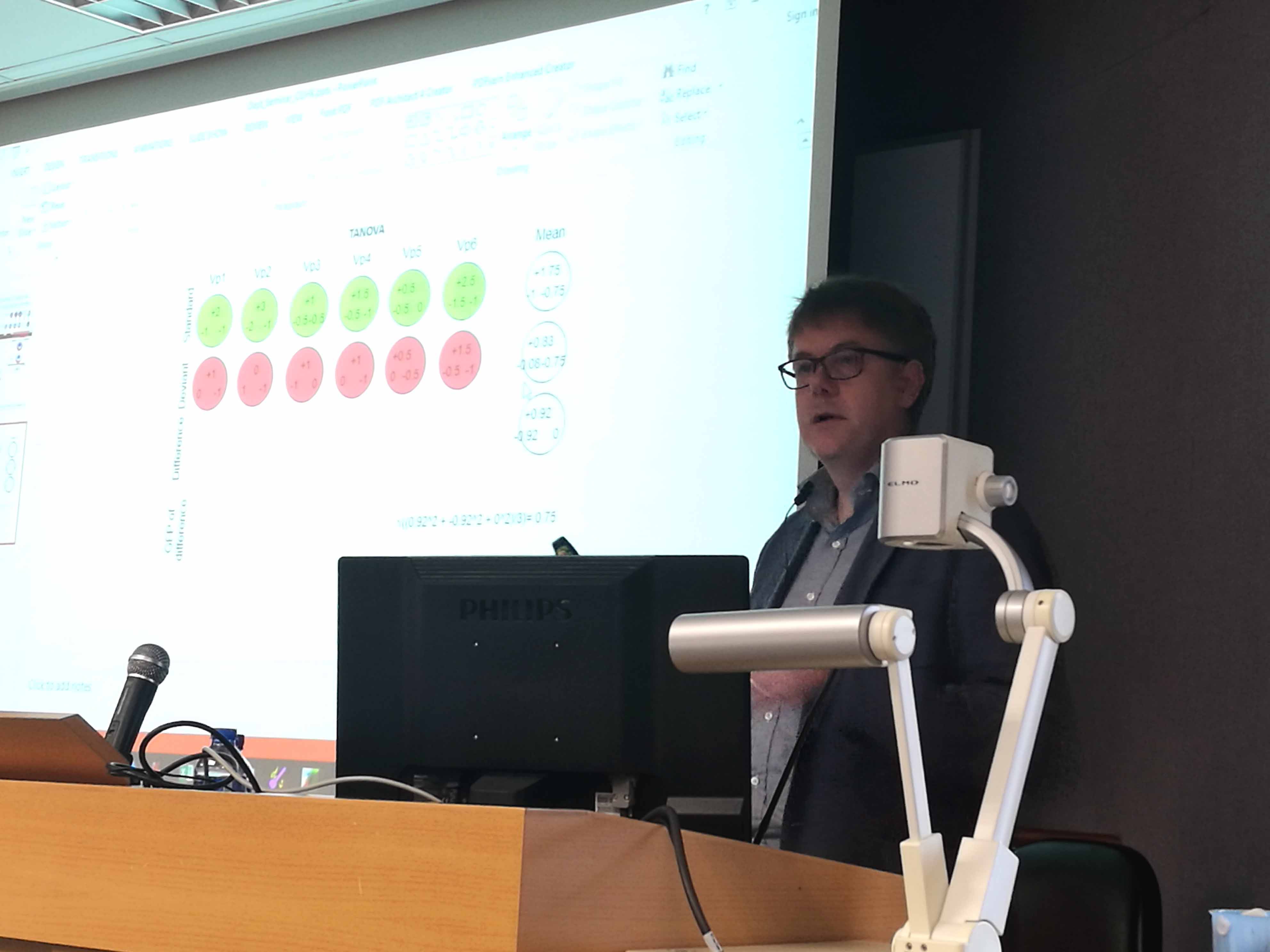專題研討會
2020 - 2021 學年
|
Click here to replay the seminar (link valid until December 7th, 2020) |
|
| Date: | November 24th, 2020 (Tuesday) |
| Time: | 11:00am -12:00nn |
| Join ZOOM Meeting: |
|
| Speaker: |
Darius Chan, Ph.D.
|
| Affiliation: | Department of Psychology, The Chinese University of Hong Kong |
| Title: |
Psychological Research on Socio-Political Attitudes: Some data from Hong Kong |
|
Worldwide, social and political issues have brought along numerous questions and challenges, and Hong Kong is no exception. In this seminar, I will discuss findings from our recent research on psychological factors associated with Hong Kong people’s attitudes toward issues such as wealth inequality and unemployment and their potential consequences. Conceptual and applied implications of the findings will also be presented. |
|
| About the Speaker: |
Darius Chan is an associate professor in the Department of Psychology at the Chinese University of Hong Kong. He is also the director of the Assessment and Training Center. His current research aims to explore the interplay of psychological, social, and political factors on family interactions and career development. |
|
Click here to replay the seminar (link valid until November 24th, 2020)
|
|
| Date: | November 10th, 2020 (Tuesday) |
| Time: | 11:00am -12:00nn |
| Join ZOOM Meeting: |
|
| Speaker: |
Qian Wang, Ph.D.
|
| Affiliation: | Department of Psychology, The Chinese University of Hong Kong |
| Title: |
The teen years: Believing is behaving |
|
Adolescence as a distinct developmental stage receives much attention from both the academic community and the general public. Culturally shaped conceptions of adolescence not only are widely held by individuals in a given society, but also have notable implications for youth’s functioning as they navigate the teen years. This seminar presents findings from a short-term longitudinal study with early adolescents in Hong Kong and Chongqing (an inland metropolis in the Mainland of China) that show in the two regions: 1) mean-level differences in conceptions of adolescence held by youth, and 2) relation-level similarities in reciprocal pathways between youth’s conceptions and their socioemotional functioning |
|
| About the Speaker: |
Qian Wang is an Associate Professor in the Department of Psychology at the Chinese University of Hong Kong, where she leads the Laboratory of Social and Personality Development. Qian and students collaborate with researchers across China and overseas to examine youth’s academic and socioemotional functioning, and in particular, the role of parents in youth development |
| Date: | October 27th, 2020 (Tuesday) |
| Time: | 11:00am -12:00nn |
| Join ZOOM Meeting: |
|
| Speaker: |
Fiona Ho, Ph.D.
|
| Affiliation: | Department of Psychology, The Chinese University of Hong Kong |
| Title: |
Harnessing Digital Technologies to Improve Behavioural and Mental Health Research |
|
In the past few decades, digital technologies have accelerated research interest within the field of psychology. This seminar will provide an overview of currently available technological developments, primarily, wearable devices which continuously monitor physical and physiological changes (e.g., activity, sleep, and heart rate variability) outside laboratory settings, and ecological momentary assessment (EMA) which collects real-time data from current states and behaviours within natural environments. Furthermore, a practical guide to usage and implementation in behavioural and mental health research will be provided. |
|
| About the Speaker: |
Fiona Ho is an Assistant Professor in the Department of Psychology at the Chinese University of Hong Kong. She is the Director of the Public Mental Health Laboratory and the Founder of a social enterprise, Wellness Travellers. Her current work strives to improve access to evidence-based psychological interventions for common mental health problems, including depression, anxiety, and sleep disturbances for the general public.
|
| Date: | September 29th, 2020 (Tuesday) |
| Time: | 11:00am -12:00nn |
| Speaker: |
Winton Au, Ph.D.
|
| Affiliation: | Department of Psychology, The Chinese University of Hong Kong |
| Title: |
To Think or Not To Think: A Question on Art Appreciation |
|
Arts has various benefits beyond a form of entertainment, yet arts participation remains low. “Not understanding art” has been a prevalent barrier to arts participation. Past studies have examined various methods to enhance cognitive understanding to enhance interest in arts. This seminar examines if cognitive understanding could be conceptualized differently. Results on appreciation of visual arts, music, dance and drama will be presented to suggest if misunderstanding, amateurish understanding, or purposefully not understanding could enhance art experience.. |
|
| About the Speaker: |
Winton Au is Associate Professor in Department of Psychology at The Chinese University of Hong Kong. He is the Founder of One Month One Art (一月一藝術) with the aim to promote arts and culture. He has been supporting research of various arts and government organizations to examine the impact of arts and culture. |
| Date: | September 15th, 2020 (Tuesday) |
| Time: | 11:00am -12:00nn |
| Speaker: |
Tomohiro Inoue, Ph.D.
|
| Affiliation: | Department of Psychology, The Chinese University of Hong Kong |
| Title: |
Cultural influences on the relation between cognitive and environmental factors and academic achievement |
|
Does culture moderate the relations between cognitive skills and children’s academic achievement? To what extent the relation between home environment and academic achievement appears to be similar across languages and cultures? In this seminar, I will present my recent research on the cognitive and environmental correlates of academic achievement (literacy and numeracy) across diverse languages and cultures. A particular focus will be placed on a longitudinal study contrasting literacy acquisition in two logographic orthographies in East Asian contexts, Chinese and Japanese. Theoretical and practical implications of the findings will be discussed. |
|
| About the Speaker: |
Prof. Tomohiro Inoue obtained his Ph.D. at the University of Tsukuba (Japan) in 2012. He stayed in the Department of Educational Psychology at the University of Alberta (Canada) as a Visiting Professor from 2016 to 2018. Prof. Inoue’s current research focuses on cognitive and environmental correlates of academic achievement across languages and cultures; risk and protective factors for learning disabilities; reading instruction and interventions. |
2019 - 2020 學年
|
|
|
| Date: | June 4th, 2020 (Thursday) |
| Time: | 9:30am - 10:30am |
| Join ZOOM Meeting: |
The link will be sent to registered participants by email |
| Speaker: |
Dwight Tse, Ph.D.
|
| Affiliation: | The Chinese University of Hong Kong |
| Title: |
Engagement in Life: An Ingredient of Human Flourishing |
|
Well-being theorists have long debated whether human flourishing is achievable through deriving pleasure (hedonism) or achieving purpose in life and personal growth (eudemonism). Flow is a subjective state characterized by intense engagement, concentration, and enjoyment, and it is considered to be an optimal experience that fits both the hedonic and eudemonic paradigms. In this seminar, I will present my work regarding the situational and dispositional antecedents as well as the outcomes of flow. I will also present my newest findings on meaningful engagement and its association with psychological well-being in multiple settings. |
|
| About the Speaker: |
Dwight Tse is a postdoctoral researcher at The Chinese University of Hong Kong. He received his Ph.D. in Psychology from Claremont Graduate University, USA in 2019. Dwight’s research interests include topics ranging from positive psychology and well-being science to aging and lifespan developmental psychology. Broadly defined, his work examines the impact of flow experiences, meaningfulness, and prosocial acts on psychological and physical well-being, using diverse methods such as experience sampling and lab-based psychophysiological experiments. His publications can be found in specialized, peer-reviewed journals such as Journal of Gerontology: Psychological Sciences and The Journal of Positive Psychology. |
|
~ CUHK PSY/GLSD PG students and faculty members are welcome ~ |
|
| Registration: | https://bit.ly/2ASB61m |
| Deadline: | June 2nd, 2020 (Tuesday) |
|
|
|
| Date: | June 2nd, 2020 (Tuesday) |
| Time: | 9:30am - 10:30am |
| Join ZOOM Meeting: |
The link will be sent to registered participants by email |
| Speaker: |
Hoi-Wing Chan, Ph.D.
|
| Affiliation: | The Chinese University of Hong Kong |
| Title: |
Understanding environmentalism beyond individual process: Insights from socioecological psychology |
|
Research studies have found how various personal factors (e.g., gender, political orientation, values) relate to people’s concerns for environmental issues and their support for environmental protection. However, most of these studies overlooked the influence of the broader socioecological contexts (e.g., culture, economic condition, quality of governance) on these individual processes, which limits the understanding and promotion of environmentalism– a global issue that involves diverse populations. We address this limitation by investigating how societal-level factors influence individual processes in shaping environmentalism. This seminar will showcase our studies that use this approach to advance the understanding of environmental concern and behavior, and discuss how to apply this approach to address other global issues in the future. |
|
| About the Speaker: |
Hoi-Wing Chan is now a postdoctoral fellow at The Chinese University of Hong Kong. He received his PhD degree from the Hong Kong University of Science and Technology in 2018. He has a broad interest in understanding the reciprocal relationship between people and the environment. His major research interests include pro-environmental behavior, socioecological influence, climate change opinions, and conspiracy beliefs. His work suggests the need to consider the influences of the broader cultural and socioecological contexts in understanding how people respond to environmental issues. |
|
~ CUHK PSY/GLSD PG students and faculty members are welcome ~ |
|
| Registration: | https://bit.ly/3ekAqAt |
| Deadline: | May 29th, 2020 (Friday) |
|
|
|
| Date: | May 29th, 2020 (Friday) |
| Time: | 9:30am - 10:30am |
| Join ZOOM Meeting: |
The link will be sent to registered participants by email |
| Speaker: |
Michael K. Yeung, Ph.D.
|
| Affiliation: | Montreal Neurological Institute, McGill University, Canada |
| Title: |
Application of functional near-infrared spectroscopy for the study of brain development and aging |
|
Compared to the rest of the brain, the frontal lobe is the last to reach full maturity but is the first to undergo deterioration with aging. Finding out how frontal lobe functions change with development and aging would thus give us invaluable insights into changes in cognition over time. In this talk, I will present on the application of functional near-infrared spectroscopy (fNIRS) to study the development and aging of frontal lobe functions. First, I will review its application in research on healthy development and aging. I will then highlight how the application of fNIRS has enhanced our mechanistic understanding of some developmental disorders, such as autism spectrum disorder, and aging-related diseases, including mild cognitive impairment and dementia. Finally, the potential utility of fNIRS in the rehabilitation of people with developmental and aging-related diseases will be discussed. |
|
| About the Speaker: |
Michael Yeung is a postdoctoral researcher at the Montreal Neurological Institute of McGill University. He obtained his Ph.D. in Psychology from the Chinese University of Hong Kong in 2018 before moving to Canada. Michael’s research focuses on understanding functions of the human frontal lobe especially in the context of development and aging. He is particularly interested in using functional near-infrared spectroscopy (fNIRS), electroencephalography (EEG), and the lesion method to find out the role of the frontal lobe in specific aspects of executive function, emotion recognition, and decision-making. His work has suggested a relationship between frontal lobe dysfunction and cognitive deficits in children with autism spectrum disorder and older adults with mild cognitive impairment. |
|
~ CUHK PSY PG students and staff are welcome ~ |
|
| Registration: | https://bit.ly/2AEc2v3 |
| Deadline: | May 27th, 2020 (Wednesday) |
|
|
|
| Date: | May 26th, 2020 (Tuesday) |
| Time: | 9:30am - 10:30am |
| Join ZOOM Meeting: |
The link will be sent to registered participants by email |
| Speaker: |
Rongjun Yu, Ph.D.
|
| Affiliation: | National University of Singapore |
| Title: |
Neurocognitive mechanisms of reward-based decision making |
|
The pervasiveness of irrational decision-making in almost every area of human endeavor highlights the importance of understanding the neurobiological and computational basis of reward-based decision-making. Contradicting with utility maximization principles, our research has shown that choices are susceptible to influences from exogenous and endogenous contexts. Using neuroeconomic methods, we demonstrate that the striatum and vmPFC seem to encode decision parameters in a context-dependent fashion, which may explain a range of decision biases. I will also showcase our findings in the application of neuroeconomics to the study of aging and psychiatry disorders. |
|
| About the Speaker: |
Rongjun Yu is an Assistant Professor of Psychology at the National University of Singapore since 2014. He received his PhD in Cognitive Science from MRC Cognition and Brain Sciences Unit, University of Cambridge in 2011 and his M.S. in Psychology from Peking University in 2007. His research interests focus on decision biases and social cooperation. In his work, he applies a wide range of methods, including behavioural experiments, pharmacological manipulation, computational modelling, and brain imaging (fMRI/EEG/fNIRS). He also studies these topics through developmental and clinical lenses. |
|
~ CUHK PSY PG students and staff are welcome ~ |
|
| Registration: | https://bit.ly/2WMlR2L |
| Deadline: | May 22nd, 2020 (Friday) |
|
|
|
| Date: | May 25th, 2020 (Monday) |
| Time: | 2:00pm -3:00pm |
| Join ZOOM Meeting: |
The link will be sent to registered participants by email |
| Speaker: |
Xianmin Gong, Ph.D.
|
| Affiliation: | Department of Psychology, University of Zurich, Switzerland |
| Title: |
Goals change across adulthood: The antecedents and consequences |
|
Personal goals change across adulthood: People primarily focus on goals towards striving for growth/gains (e.g., acquiring new knowledge and skills) in early adulthood, but increasingly focus more on goals towards maintenance (e.g., maintaining emotional satisfaction) and loss avoidance (e.g., avoiding health problems) in late adulthood. In this seminar, I will present my research on why such changes occur (antecedents) and how the changes influence people’s cognitive processes, social behaviors, and well-being (consequences). |
|
| About the Speaker: |
Xianmin Gong is a postdoctoral researcher at University of Zurich, Switzerland. He received his master’s degree from Beijing Normal University in 2013 and PhD degree from The Chinese University of Hong Kong in 2017. He has a broad interest in various aspects of adulthood development and aging. Using multiple methods, his current research particularly focuses on how goals in different life domains change with age, why they change, and what the consequences are. |
|
~ CUHK PSY PG students and staff are welcome ~ |
|
| Registration: | https://bit.ly/2Z4f5XB |
| Deadline: | May 21st, 2020 (Thursday) |
|
|
|
| Date: | March 17th, 2020 (Tuesday) |
| Time: | 11:00am -12:00nn |
| Join ZOOM Meeting: |
|
| Speaker: |
Chin-Ming Hui, Ph.D.
|
| Affiliation: | Department of Psychology, The Chinese University of Hong Kong |
| Title: |
Let's work together: Conflict management in close relationships |
|
In close relationships, conflict is inevitable such that relationship partners have to work on the balance between their needs and their relationship’s interests. To manage conflict situations, individuals may ideally want to show responsiveness to the partner’s needs and stay calm. These outcomes can often be achieved via the joint efforts of both partners. In this presentation, I will present my works about the dyadic processes involved in communication of responsiveness and emotion regulation during conflict resolution. |
|
| About the Speaker: |
Prof. Hui is currently an assistant professor of psychology at the Chinese University of Hong Kong. He obtained his Ph.D. in Social Psychology from Northwestern University. His key research areas are self-regulation and close relationships. His work appears in Journal of Personality and Social Psychology, Psychological Science, and Social Psychological and Personality Science. |
|
|
|
| Date: | January 14th, 2020 (Tuesday) |
| Time: | 11:00am -12:00nn |
| Venue: |
Room 619, Sino Building, Chung Chi College, CUHK |
| Speaker: |
Alan Chun-Nang Wong, Ph.D.
|
| Affiliation: | Department of Psychology, The Chinese University of Hong Kong |
| Title: |
What does the spatial-temporal pattern of EEG data reveal about human object recognition? |
|
With electroencephalogram (EEG) data, we often adopt event-related potential (ERP) analysis, i.e., averaging the activation across the trials of a condition for a certain channel or group of channels. When an ERP component reveals higher activation for one condition over another, a question arises as to what this means. For example, does higher activation mean more engagement of the brain, or does it mean less efficient processing? In the past 15 years, multivariate pattern analysis (MVPA) of neuroimaging data has shown that the variation of activation across brain recording locations and time can reveal more information than traditional univariate analysis. However, compared with studies using fMRI, it is much less common for EEG studies to adopt MVPA. In this talk I will give a conceptual introduction of multivariate analysis of neuroimaging data, and share our recent experience in using this technique in three EEG studies of perception. These studies involved different modalities (visual and auditory), participants (novices and experts of a domain), and data specifics (e.g., 20-128 channels). I will discuss how MVPA helps inform object recognition in these studies, and also the strengths and weaknesses of the technique. |
|
| About the Speaker: |
Alan Wong is an associate professor at the Department of Psychology at the Chinese University of Hong Kong. He had his undergraduate and master training at the Chinese University of Hong Kong before receiving his PhD degree from Vanderbilt University. His research interests concern expert object recognition, perceptual training, and multitasking. |
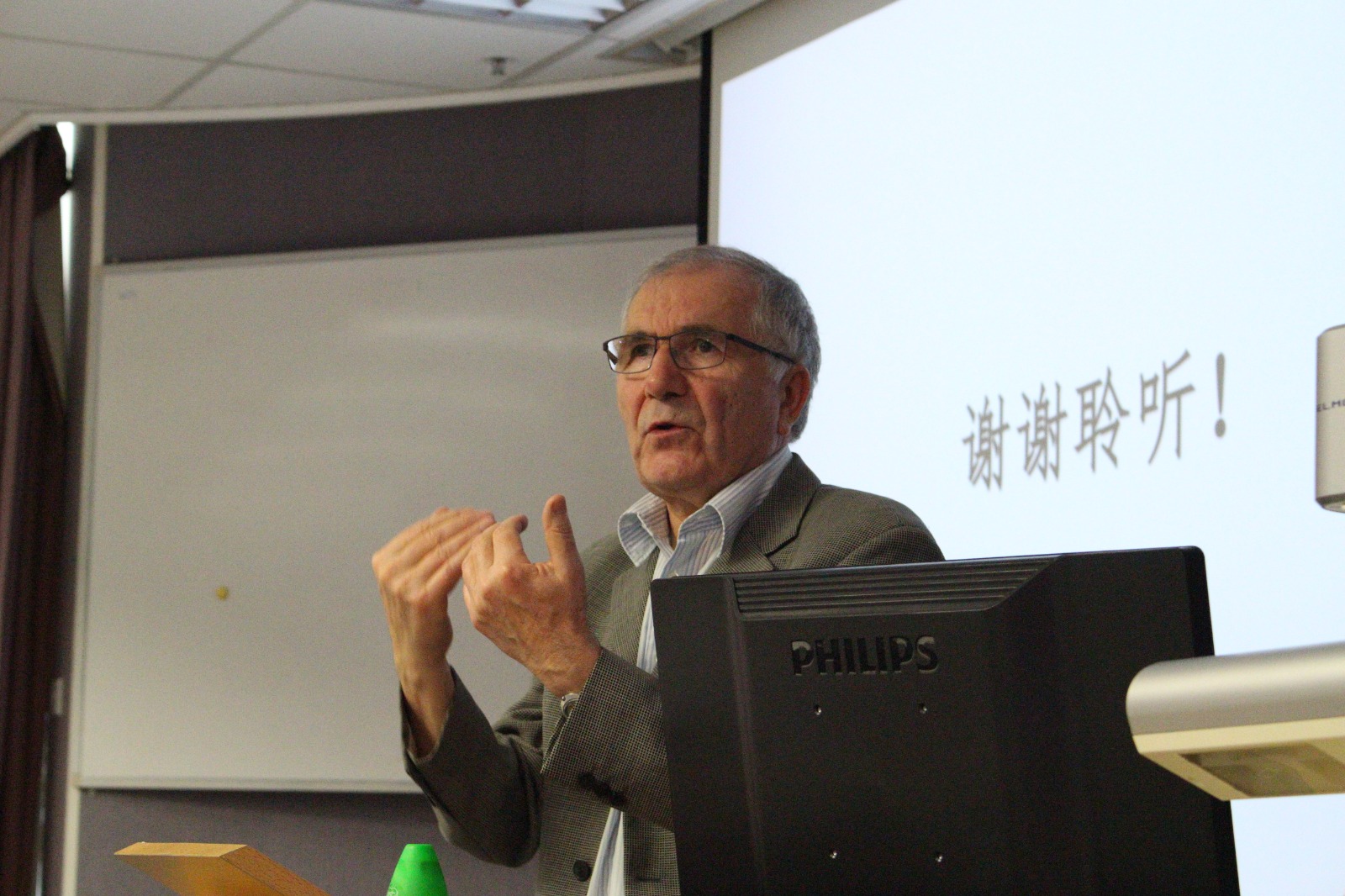 |
|
| Date: | November 26th, 2019 (Tuesday) |
| Time: | 11:00am -12:00nn |
| Venue: |
Room 619, Sino Building, Chung Chi College, CUHK |
| Speaker: |
Werner Sommer, Ph.D.
|
| Affiliation: | Department of Psychology, Humboldt-Universität zu Berlin |
| Title: |
Individual Differences in Face Cognition: Psychometrics and Neural Underpinnings |
|
Fast and accurate processing of faces (person identity, emotion, eye gaze, speech movements, gender, attractiveness) is essential for human communication and interaction. During the last 10 years my colleagues and I have studied differences between persons and the underlying neural mechanisms in a number of large-scale experiments. I will first summarize our results about the cognitive structure of face cognition and whether it is affected by age and gender. Then I will report our research on the neural mechanisms of individual differences in face cognition, as reflected in event-related brain potentials.
|
|
| About the Speaker: |
Werner Sommer received his PhD degree from the University of Konstanz and was Professor for Biological Psychology and Psychophysiology at the Humboldt-Universität zu Berlin until his retirement in 2018. His current research interests are cognitive control, face processing, individual differences in socio-emotional processes, language, eating/meals, and hypnosis, using mainly (but not exclusively) event-related brain potentials as research tool. Prof. Sommer currently engages in several international research cooperations, including partners at the Chinese University of Hong Kong. |
| Date: | November 12th, 2019 (Tuesday) |
| Time: | 11:00am -12:00nn |
| Venue: |
Room 619, Sino Building, Chung Chi College, CUHK |
| Speaker: |
Patrick W L Leung, Ph.D.
Professor |
| Affiliation: | Department of Psychology, The Chinese University of Hong Kong |
| Title: |
Efficiency drive for psychological intervention: How? Can technology/internet help? Will effectiveness/efficacy be eventually compromised? |
|
There is emerging consensus that psychological intervention does help. However, demand is fast outgrowing the supply. In recent years, there is a determined effort to enhance the efficiency of psychological intervention so that more needy individuals can share the limited resources. In this talk, I will present three preliminary clinical trials which represent three different approaches of driving efficiency, including shortening the intervention, transdiagnostic treatment of multiple disorders, and internet-based therapy minimizing therapist's involvement. The burning question is whether these efforts compromise or trade effectiveness/efficacy for efficiency. |
|
| About the Speaker: |
Prof. Patrick W L Leung is a trained clinical psychologist. Before joining the academic world, he had 10 years of full-time clinical practice at a local children's hospital. This clinical experience leads to his research interests in child and adolescent psychopathology, such as ADHD and ASD. Recently, he develops a second line of research, i.e., establishing and validating treatment protocols for various common mental disorders for evidence-based clinical practice. |
|
|
|
| Date: | October 29th, 2019 (Tuesday) |
| Time: | 11:00am -12:00nn |
| Venue: |
Room 619, Sino Building, Chung Chi College, CUHK |
| Speaker: |
Chui-De Chiu, Ph.D.
Assistant Professor |
| Affiliation: | Department of Psychology, The Chinese University of Hong Kong |
| Title: |
Self-representation in the dissociative mind |
|
Dissociation is a common symptom of a group of mental disorders with an intimate relation with psychological trauma. Yet, this role of psychological trauma in the pathogenesis of dissociation is under heated debate, for the varying strength of the relationship between trauma and dissociation in the nonclinical and clinical populations. In the current talk, I will introduce a new framework for the link between trauma and dissociation. I argue that there may be a neurocognitive diathesis that moderates the response to traumatic stress. The sociocognitive experiments conducted in our laboratory to examine this hypothesis will be reviewed. |
|
| About the Speaker: |
Prof. Chui-De Chiu obtained his M.S. and Ph.D. in Clinical Psychology at National Taiwan University. He stayed in Leiden University (The Netherlands) and Central Institute of Mental Health at Mannheim (Germany) as a visiting scholar and then as a post-doctoral scientific researcher from 2012 to 2013. He has been appointed as assistant professor at the Department of Psychology, The Chinese University of Hong Kong since December, 2013. |
|
|
|
| Date: | October 15th, 2019 (Tuesday) |
| Time: | 11:00am -12:00nn |
| Venue: |
Room 619, Sino Building, Chung Chi College, CUHK |
| Speaker: |
Nicholas Rawlins, Ph.D.
Professor (by Courtesy) |
| Affiliation: | Department of Psychology, The Chinese University of Hong Kong |
| Title: |
Pain and the Brain: Fears and Phantoms |
|
Chronic pain can impose immense personal and societal costs. The pain itself is only part of the problem: anxiety about pain in the future also contributes. Functional imaging shows that related, yet separate, brain circuits underlie these different aspects of painful experiences. Signals that an impending event could be particularly painful make subjects more anxious and enhance perceived pain intensities, through yet further circuits. Might signals that reduce anxiety about impending pain therefore reduce perceived pain intensity? Finally, could understanding the neural basis of phantom limb pain lead to interventions that ameliorate this highly distressing, yet treatment-resistant, condition.
|
|
| About the Speaker: |
Professor Nick Rawlins became Master of Morningside College in December 2018. He is a behavioural neuroscientist whose research spans areas including the neural basis of memory, brain degeneration, pain and anxiety. He completed his BA and DPhil at University College, Oxford and was appointed to a series of posts there before becoming Watts Professor of Psychology in 2007 and Pro-Vice-Chancellor for Development and External Affairs in 2010. On leaving Oxford in 2017 he became Vice-President (Development and International) of the Toulouse School of Economics. He is Emeritus Professor of Behavioural Neuroscience at the University of Oxford where he also holds Emeritus Fellowships at University College and Wolfson College. He is a Fellow of the Academy of Medical Sciences and a Fellow of the British Psychological Society. |
|
|
|
| Date: | September 24th, 2019 (Tuesday) |
| Time: | 11:00am -12:00nn |
| Venue: |
Room 619, Sino Building, Chung Chi College, CUHK |
| Speaker: |
Liqiang HUANG, Ph.D.
Associate Professor |
| Affiliation: | Department of Psychology, The Chinese University of Hong Kong |
| Title: |
Visual features for perception, attention, and working memory: Toward a three-factor framework |
|
Visual features are the general building blocks for attention, perception, and working memory. Here, I tried to combine the strengths of experimental and correlational approaches in a novel way by developing an individual-item differences analysis to extract the factors from 16 stimulus types on the basis of their roles in eight tasks. Three orthogonal factors were identified which correspond respectively to featural strength (i.e., how close a stimulus is to a basic feature), visual strength (i.e., visual quality of the stimulus), and spatial strength (i.e., how well a stimulus can be represented as a spatial structure). This FVS framework is subsequently extended to additional tasks and applied to study various questions such as the processing of Chinese characters, movements, and colors.
|
|
| About the Speaker: |
Liqiang Huang works in the Department of Psychology, The Chinese University of Hong Kong. His research focuses on visual attention and its role in visual perception, visual awareness, and visual working memory. His undergraduate training was in Optical Engineering at Zhejiang University, followed by a Ph.D. in Experimental Psychology from UC San Diego, and postdoctoral research at Princeton University. |
2018-2019 學年
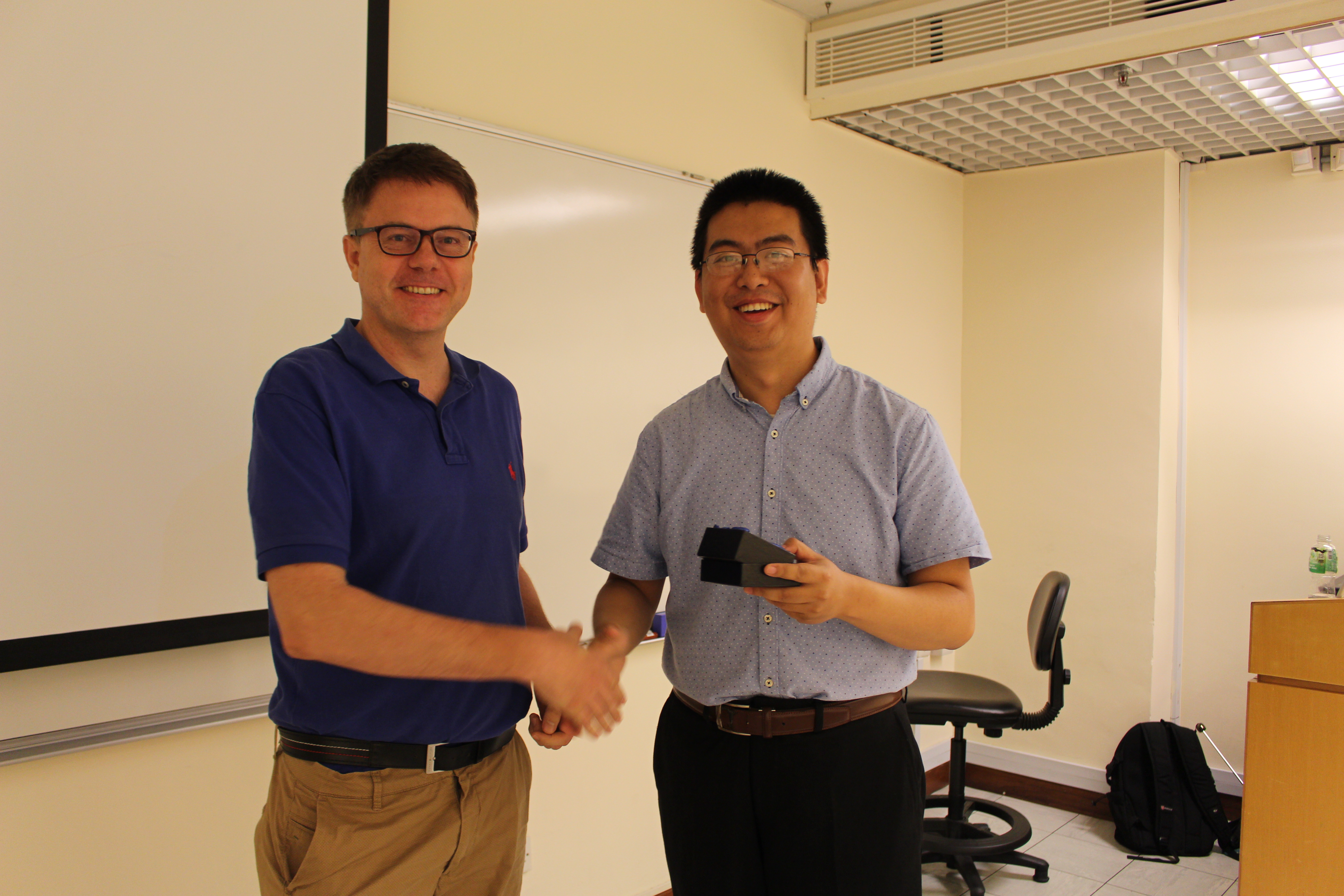 |
|
| Date: | May 28th, 2019 (Tuesday) |
| Time: | 11:00am -12:00nn |
| Venue: |
UG01, Wong Foo Yuan Building, Chung Chi College, CUHK |
| Speaker: |
Felix WANG, Ph.D.
Assistant Professor |
| Affiliation: | Department of Psychology, University of Nevada, Las Vegas |
| Title: |
A rhythm account of statistical learning |
|
Even from a brief exposure to an artificial spoken language, infants and adults can identify candidate word forms and other adjacent and non-adjacent dependencies present in the acoustic input. Among the influential theories resulting from this research is the proposal that humans compute conditional probabilities of adjacent and non-adjacent elements to discover underlying structure. However, there exist findings in the literature, including the results presented here, that are not consistent with such accounts. We propose that the perception of rhythm played an important role in prior studies, and in general that rhythm perception plays a critical role in determining which dependencies listeners can identify. We created a novel experimental paradigm to introduce a rhythm in the language stream that allowed us to manipulate the rhythm systematically. We showed that even learning adjacent dependencies with conditional probabilities of 1.0 depends on rhythm perception. We also developed a computational model to explain word segmentation in terms of rhythm perception, and we present simulations showing that the model captures patterns of human data from multiple experiments. We argue that the perception of rhythm holds explanatory power not only to our experiments and other dependency learning studies, but it is likely to be a fundamental mechanism that is ubiquitous in language and other auditory domains. |
|
| About the Speaker: |
Felix Wang received his Ph.D. in Psychology at the University of Southern California in 2016 with Dr. Toben Mintz and Jason Zevin. After graduation, he worked as a postdoctoral researcher in the Department of Psychology at the University of Pennsylvania, with Dr. Lila Gleitman and John Trueswell. He is currently an assistant professor in the Department of Psychology at the University of Nevada, Las Vegas. His work focuses on two broad themes, statistical learning of how elements are structured in a sequence and the learning of the meaning of words. His work on statistical learning uses artificial language studies to simulate how children discover the structure of their language, when properties of the language are controlled. His work on word learning focuses on two Quinian problems: the problems of referential ambiguity and semantic ambiguity. Methodologically, he builds computational models of language acquisition and conduct behavioral experiments with infants, children, and college students. His goals in these work is to try to identify the cognitive mechanisms that underlie the process of language acquisition. |

| Date: | May 8th, 2019 (Wednesday) |
| Time: | 11:00am -12:00nn |
| Venue: |
Room 619, Sino Building, Chung Chi College, CUHK |
| Speaker: |
Virginie VAN WASSENHOVE, Ph.D.
Research Director |
| Affiliation: | Cognitive Neuroimaging Unit, CEA DRF/Joliot, INSERM, Université Paris-Sud, Université Paris-Saclay, NeuroSpin center, 91191 Gif/Yvette, France |
| Title: |
Making sense of time in the human mind |
|
While we are all experts in “experiencing time”, introspection provides us with very little intuition regarding the neural mechanisms supporting time perception and temporal cognition. In this talk, I will discuss the importance of clocking mechanisms for the biology of the mind, and how oscillations help reframing temporalities from the perspective of the brain itself (as generator-observer of events) in opposition to that of the external observer (as information reader). I will illustrate this point by focusing on the role of oscillatory activity in low-level temporal logistics of information processing, yielding temporal order and behavioral precision. Second, I will focus on the notion that conscious timing does not linearly map onto neural timing – i.e., that psychological temporalities are represented abstractly and intelligibly - and exemplify this with recent work focused on the generative nature of the psychological time arrow (mental time travel), and the ability to introspect about one’s self-generated timing productions (temporal metacognition). |
|
| About the Speaker: |
Virginie van Wassenhove received her PhD in Neurosciences and Cognitive Sciences (NACS program, 2004) at the University of Maryland, College Park (UMCP) under the direction of Prof David Poeppel and Dr Ken W. Grant. During her graduate training, she focused on the perception (psychophysics) and cortical bases (MEG, EEG, fMRI) of audiovisual speech as a specific case of multisensory integration and predictive coding. In 2005, she worked with Prof Srikantan Nagarajan (UCSF) on learning and plasticity in audition and in audiovisual perception with combined psychophysics and MEG. From 2006 to 2008, she was implicated in various projects at UCLA (Dr Ladan Shams, Dr Dean Buonomano) and at Caltech (Prof Shinsuke Shimojo) which included implicit multisensory statistical learning, time perception, gesture communication, and interpersonal interactions. Late 2008, she joined the Cognitive Neuroimaging Unit directed by Prof Stanislas Dehaene to build NeuroSpin MEG. In 2012, she became an INSERM group leader of the Brain Dynamics research team. In 2013, she obtained her HDR (Habilitation à Diriger des Recherches; highest degree achievable in France) and became CEA Director of Research (DR). Her research interests focus on temporal cognition and multisensory integration.
|
| Date: | April 9th, 2019 (Tuesday) |
| Time: | 11:00am -12:00nn |
| Venue: |
Room 619, Sino Building, Chung Chi College, CUHK |
| Speaker: |
Suzanne Ho-Wai SO, Ph.D.
Associate Professor Letty Yan-Yee KWAN Ph.D.
Associate Professor
|
| Affiliation: | Department of Psychology, CUHK |
| Title: |
eLearning for Psychology: Tried + Tested |
|
We may have heard of flipped classroom, blended learning, micro-modules, and MOOCs. We might have used uReply, Blackboard, Panopto, KEEP, etc. Are they helpful for teaching and learning of psychology? Do they support our teaching or take away our jobs? Do students learn better or enjoy the class more with the help of eLearning approaches? In this seminar, several teachers from the Department of Psychology will share with you our attempts of applying eLearning approaches in our teaching. As we reflect on our successes and failures, we hope to re-visit how we may teach and learn psychology better. |
|
| About the Speaker: |
Dr Suzanne So is Associate Professor at the Department of Psychology, CUHK. She obtained her BSc in University of Oxford, MSSc (Clinical Psychology) in CUHK, and PhD in King’s College London. With the support of the UGC Teaching Award and the CUHK Micro-module Courseware Development Grant Scheme, she has developed two sets of micro-modules on clinical psychology and clinical supervision. Dr Letty Kwan is an Assistant Professor at the Department of Psychology, CUHK. She obtained her BSc in University of Michigan, Ann Arbor, and her PhD in University of Illinois, Urbana-Champaign. Her research interest is to understand how psychological theories can be used to understand and improve creativity and innovation. |
| Date: | March 26th, 2019 (Tuesday) |
| Time: | 11:00am -12:00nn |
| Venue: |
Room 619, Sino Building, Chung Chi College, CUHK |
| Speaker: |
Daniel BRANDEIS, Ph.D.
Professor |
| Affiliation: | Department of Child and Adolescent Psychiatry and Psychotherapy University of Zürich Department of Child and Adolescent Psychiatry and Psychotherapy Central Institute of Mental Health, Medical Faculty Mannheim Heidelberg University |
| Title: |
Biomarkers and neurodevelopmental disorders - lessons from EEG-based markers of ADHD |
|
Biomarkers are informative biological correlates of disorders, but hardly meet the strict validity, sensitivity, specificity and replication requirements for clinical application. EEG-based markers in ADHD have revealed multiple impaired and preserved functions, heterogeneous EEG clusters undercutting clinical subtypes, and markers of remission and persistence. However, diagnostic classification of ADHD based on simple EEG markers such as the Theta/Beta ratio or cognitive ERPs was not validated, and is not recommended by clinical guidelines. Multimodal pattern recognition can improve classification, but also requires independent replication and validated mechanisms. Validating predictive biomarkers that characterize course, outcome and treatment response seem most promising. Particularly for neurodevelopmental disorders validated predictive biomarkers could guide early detection, prevention and precision medicine interventions across disorders, moving beyond a narrow focus on single disorders, core deficits, and categorical diagnoses. |
|
| About the Speaker: |
Daniel Brandeis is Professor at the Universities of Zurich and Heidelberg, with research groups at the Departments of Child and Adolescent Psychiatry and Psychotherapy in Zurich and at the ZI Mannheim. Following Masters in Neuroscience at ETH Zurich and in Psychology at UBC Vancouver, he completed his PhD at ETH Zurich focusing on brain mapping of attention and reading in the Neurology Department in Zurich. After postdoctoral positions in San Francisco, Zurich and Mito, he focuses on mechanisms and treatments of neurodevelopmental disorders like ADHD, Dyslexia, aggression and autism, using translational EEG- and MR-based imaging and neurofeedback. |
| Date: | March 12th, 2019 (Tuesday) |
| Time: | 11:00am -12:00nn |
| Venue: |
Room 619, Sino Building, Chung Chi College, CUHK |
| Speaker: |
Catherine MCBRIDE, Ph.D.
Professor |
| Affiliation: | Department of Psychology, The Chinese University of Hong Kong |
| Title: |
“What have you done for me lately?” A brief history of my attempts at “impact” in academia |
|
Departments in universities around Hong Kong are currently grappling with the issue of how best to create and communicate “impact” in our institutions. The RAE exercise of evaluation emphasizes impact for the first time in Hong Kong. In this talk, I will give a personal history of my motivations, attempts, and actions vis-à-vis impact. We will also consider different definitions and motivations for impact in a broader sense. At the university level in Hong Kong, impact has very specific definitions and requirements, some of which fit better with RAE criteria than others. Yet ultimately, each of us in academia has some responsibility to answer the question, common among governments and the general public, as to “What have you done for me lately?” My discussion will be an attempt to map my research to the broader theme of impact and to talk generally about academics’ current engagements with the public. |
|
| About the Speaker: |
Catherine McBride is a professor of developmental psychology at The Chinese University of Hong Kong. She spent the last academic year as a Senior Fellow at the Freiburg Institute for Advanced Study (FRIAS) in Germany, working on a book entitled Coping with Dyslexia, Dysgraphia, and ADHD: A Global Perspective (Routledge, 2019). The author of over 200 peer-reviewed journal articles, she is a past President of the Society for the Scientific Study of Reading and current President of the Association for Reading and Writing in Asia. She has also served as an associate editor of four different journals and on editorial boards of several others. With collaborators, she has published research on reading and writing in Arabic, Bemba, Chinese, Dutch, English, German, Hebrew, Korean, and Spanish. Her main interests focus on similarities and differences in reading development and impairment across languages, scripts, and cultures. |
|
|
|
| Date: | March 5th, 2019 (Tuesday) |
| Time: | 11:00am -12:00nn |
| Venue: |
Room 619, Sino Building, Chung Chi College, CUHK |
| Speaker: |
Annett SCHIRMER, Ph.D.
Professor |
| Affiliation: | Department of Psychology, The Chinese University of Hong Kong |
| Title: |
Linear Mixed Effect (LME) Modeling in R (Follow up session) |
|
Recent advances in computing technology as well as the development of user-friendly software applications have allowed LME modeling to become a popular tool for psychological research. In this talk, I will shortly introduce the theoretical aspects of LME modeling and provide an overview on how LME modeling may be implemented in R (https://www.r-project.org/). Specifically, I will give a beginner’s tour of the R Studio environment (https://www.rstudio.com/), discuss LME modeling alternatives and syntax, and how to conduct significance testing of full models and of follow-up comparisons. Last, I will share my experience of the current status of the application of LME modeling in the psychological literature and provide some guidelines as to how such modeling should be documented in manuscripts to be submitted for publication. |
|
| About the Speaker: |
Annett Schirmer graduated with a Psychology Diploma from Leipzig University, Germany in 1999 and then pursued a graduate degree at the Max Planck Institute of Cognitive Neuroscience in Leipzig. She was awarded a PhD in 2002. After completing a post-doc at the same institute, Annett Schirmer started as an Assistant Professor at the University of Georgia, Athens, USA in 2005. She moved to the National University of Singapore in 2006 and achieved the rank of Associate Professor in 2009. Since 2017, she holds a Professor appointment at The Chinese University of Hong Kong. Annett Schirmer has served at the editorial board of The British Journal of Psychology and is currently an Associate Editor with Social, Cognitive, and Affective Neuroscience. Her work tackles the effect of nonverbal emotional signals including vocal and tactile expressions on the mental processes of interaction partners. To this end, she uses a range of behavioral (e.g., priming) and neuroimaging techniques (e.g., EEG, fMRI). She has published 50 international research articles and is the sole author of an undergraduate textbook entitled “Emotion” that appeared with Sage. |
|
|
|
| Date: | February 26th, 2019 (Tuesday) |
| Time: | 11:00am -12:00nn |
| Venue: |
Room 619, Sino Building, Chung Chi College, CUHK |
| Speaker: |
Annett SCHIRMER, Ph.D.
Professor
|
| Affiliation: | Department of Psychology, The Chinese University of Hong Kong |
| Title: |
Linear Mixed Effect (LME) Modeling in R |
|
Recent advances in computing technology as well as the development of user-friendly software applications have allowed LME modeling to become a popular tool for psychological research. In this talk, I will shortly introduce the theoretical aspects of LME modeling and provide an overview on how LME modeling may be implemented in R (https://www.r-project.org/). Specifically, I will give a beginner’s tour of the R Studio environment (https://www.rstudio.com/), discuss LME modeling alternatives and syntax, and how to conduct significance testing of full models and of follow-up comparisons. Last, I will share my experience of the current status of the application of LME modeling in the psychological literature and provide some guidelines as to how such modeling should be documented in manuscripts to be submitted for publication. |
|
| About the Speaker: |
Annett Schirmer graduated with a Psychology Diploma from Leipzig University, Germany in 1999 and then pursued a graduate degree at the Max Planck Institute of Cognitive Neuroscience in Leipzig. She was awarded a PhD in 2002. After completing a post-doc at the same institute, Annett Schirmer started as an Assistant Professor at the University of Georgia, Athens, USA in 2005. She moved to the National University of Singapore in 2006 and achieved the rank of Associate Professor in 2009. Since 2017, she holds a Professor appointment at The Chinese University of Hong Kong. Annett Schirmer has served at the editorial board of The British Journal of Psychology and is currently an Associate Editor with Social, Cognitive, and Affective Neuroscience. Her work tackles the effect of nonverbal emotional signals including vocal and tactile expressions on the mental processes of interaction partners. To this end, she uses a range of behavioral (e.g., priming) and neuroimaging techniques (e.g., EEG, fMRI). She has published 50 international research articles and is the sole author of an undergraduate textbook entitled “Emotion” that appeared with Sage. |
| Date: | February 12th, 2019 (Tuesday) |
| Time: | 11:00am -12:00nn |
| Venue: |
Room 619, Sino Building, Chung Chi College, CUHK |
| Speaker: |
Agnes Sui-Yin CHAN, Ph.D.
Professor |
| Affiliation: | Department of Psychology, The Chinese University of Hong Kong |
| Title: |
Reduced Frontal Activations at High Working Memory Load in Mild Cognitive Impairment: Near-Infrared Spectroscopy |
|
Some functional magnetic resonance imaging studies have reported altered activations in the frontal cortex during working memory (WM) performance in individuals with mild cognitive impairment (MCI), but the findings have been mixed. The objective of the present study was to utilize near-infrared spectroscopy (NIRS), an alternative imaging technique, to examine neural processing during WM performance in individuals with MCI. Results showed that the MCI group, unlike the NC group, did not exhibit significantly increased frontal activations bilaterally when WM load increased. Compared to the NC group, the MCI group had similar frontal activations at low load (p > 0.05 on all channels) but reduced activations at high load (p < 0.05 on 4 channel). In addition, we found a positive correlation between the left WM-related frontal activations and WM ability primarily in the NC group (rs = 0.42, p = 0.035), suggesting a relationship between frontal hypoactivation and WM difficulties. |
|
| About the Speaker: |
Chan Sui Yin, Agnes is currently a professor at the Department of Psychology of the Chinese University of Hong Kong and the Director of the Chanwuyi Research Center for Neuropsychological Well-Being. She obtained a doctoral degree in 1995 majoring in clinical neuropsychology from the University of California at San Diego. Prof. Chan’s research interest has been on clinical neuropsychology and neuropsychological intervention. Her research has been published in Top-ranking journals includingNature, Archive of Neurology, Cancer, Neuropsychology and Journal of Affective Disorder. In 2004, Professor Chan was awarded the Early Career Award by the American Psychological Association, and has held several honorary positions including Adjunct Professor at the University of Michigan at Ann Arbor, and Consultant to the Alzheimer's disease Research Center at the University of California at San Diego. She had served as an Associate Editor of Neuropsychology. SheisanauthorofTheHongKongListLearningTestthatisamostcommonlyusedclinical neuropsychological tests in Hong Kong. Her other publications (in Chinese) for general public included Four- Principles to Enhance Children's Brain Functioning (Chung Hwa Book Co., 2009) and Dejian Mind-Body Intervention 5th Edition (Chanwuyi Publishing House Limited, 2013; Guangming Daily Publishing Limited, 2014 - simplified form). |
|
|
|
| Date: | January 15th, 2019 (Tuesday) |
| Time: | 11:00am -12:00nn |
| Venue: |
Room 619, Sino Building, Chung Chi College, CUHK |
| Speaker: |
Urs Maurer, Ph.D.
Associate Professor |
| Affiliation: | Department of Psychology, The Chinese University of Hong Kong |
| Title: |
Introduction to topographic EEG analysis and tutorial for the software RAGU |
|
EEG data contain temporal and spatial (topographic) information. The analysis of topographic information is useful, because it reflects the neural source configurations in the brain. In this talk I will give a short introduction into topographic EEG analyses and then provide a hands-on-tutorial with the software RAGU (Randomization Graphical User Interface; the software can be downloaded at http://www.thomaskoenig.ch/index.php/work/ragu/1-ragu). Using RAGU, I will demonstrate how to compute a Topographic Analysis of Variance (TANOVA) and a Microstates Analysis with EEG data. |
|
| About the Speaker: |
Urs Maurer is an Associate Professor at the Department of Psychology at the Chinese University of Hong Kong. Previously, he was a Research Professor at the University of Zurich and a postdoctoral fellow at the Weill Medical College of Cornell University in New York. In his research he uses neuroimaging techniques, such as Electroencephalography and functional Magnetic Resonance Imaging, to investigate reading acquisition, dyslexia, foreign language learning, and reading across different languages. |
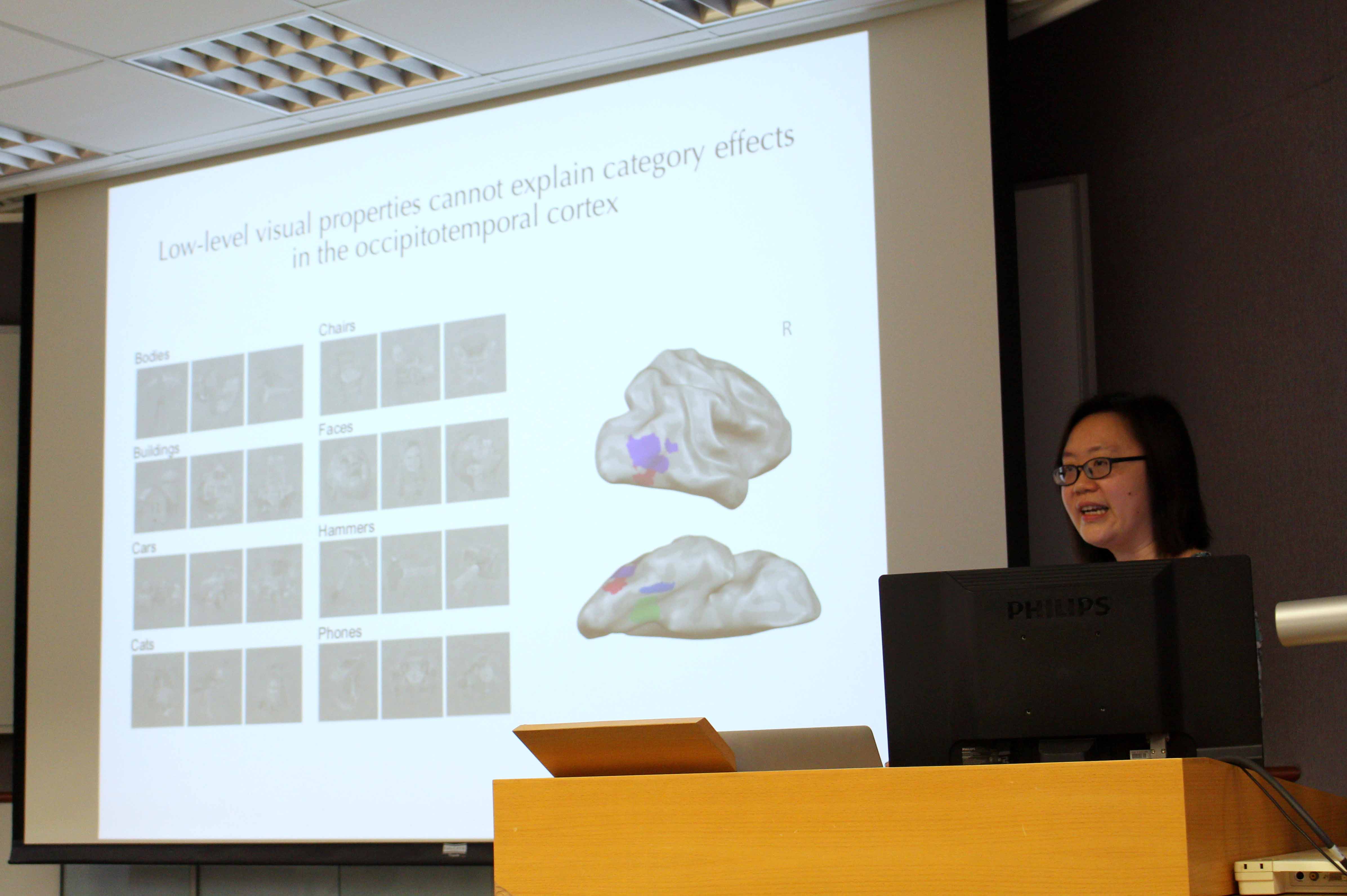
| Date: | November 27th, 2018 (Tuesday) |
| Time: | 11:00am -12:00nn |
| Venue: |
Room 619, Sino Building, Chung Chi College, CUHK |
| Speaker: |
Olivia Cheung, Ph.D.
Assistant Professor |
| Affiliation: | New York University Abu Dhabi |
| Title: |
From percepts to concepts:Understanding category selectivity for animals and objects |
|
We maintain stable representations of the world via interactions of incoming sensory input and existing conceptual knowledge about the world. Distinct concepts, such as animate and inanimate entities, often share vast and systematic differences in visual features. As the brain transforms percepts into concepts, to what extent the mental and neural representations contain visual vs. conceptual information? In this talk, I present behavioral and neural evidence that the well-documented distinction between animal and object representations are unlikely merely due to differences in low-level visual or shape properties. Instead, the involvement of higher-level conceptual influences may play a critical role for interpreting visual input during categorization. |
|
| About the Speaker: |
Olivia Cheung is an Assistant Professor of Psychology at New York University Abu Dhabi. Her research aims to understand how we utilize multiple sources of knowledge to perceive the visual world. Olivia holds a Ph.D. in Psychology from Vanderbilt University. Before joining NYU Abu Dhabi, she did postdoctoral research at Harvard Medical School, at the Center of Mind/Brain Sciences (CIMeC) in Trento, Italy, and at Harvard University. |
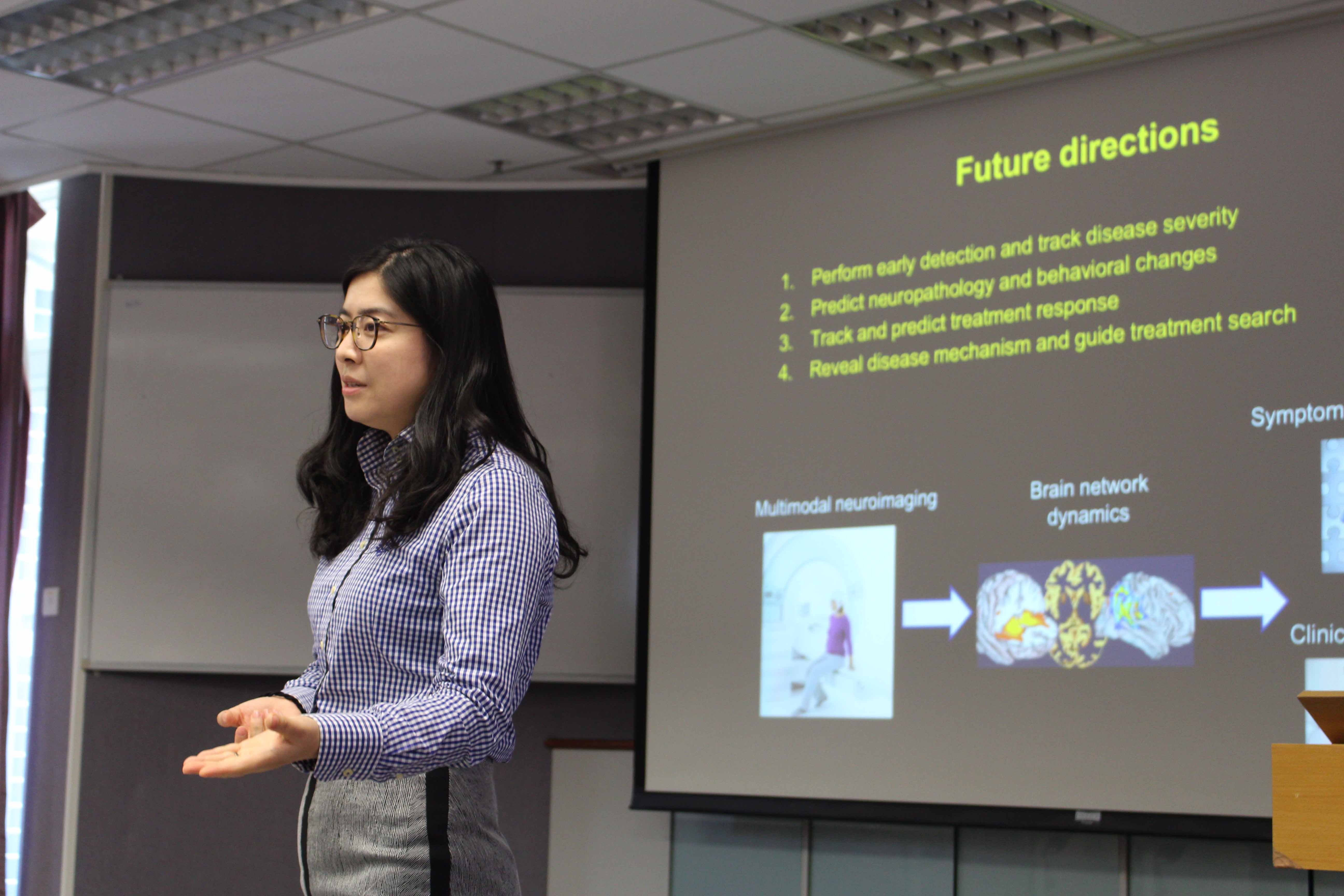
| Date: | November 19th, 2018 (Monday) |
| Time: | 11:00am -12:00nn |
| Venue: |
Room 619, Sino Building, Chung Chi College, CUHK |
| Speaker: |
Helen Juan Zhou, Ph.D.
Assistant Professor Center for Cognitive Neuroscience, Neuroscience and Behavioral Disorders Program
|
| Affiliation: | Duke-National University of Singapore Medical School, Singapore |
| Title: |
Brain network functional dynamics in neuropsychiatric disorders: linking connectivity to behaviour |
|
Previous work has demonstrated that the spatial patterning of each neurodegenerative disease relates closely to a distinct functional intrinsic connectivity network mapped in the healthy brain with “resting-state” fMRI. This talk will first describe how brain network functional connectivity shed light on the vulnerable network-breakdown mechanisms in different neurodegenerative disorders. Evidence on longitudinal functional connectivity changes underlying cognitive impairment in healthy older adults and the influence of APOE genotype will be presented. Moreover, our work on persons at-risk for psychosis revealed that baseline functional connectome topological disruptions were associated with future transition to psychosis. Lastly, we will discuss new evidence on linking dynamic functional connectivity with vigilance fluctuations over time and neural substrates underlying behavioral improvement in ADHD. Further developed, brain network connectivity signatures may help predict behavioral changes, reveal disease mechanism, track disease progression, and monitor treatment response. |
|
| About the Speaker: |
Dr. Juan (Helen) Zhou is an Assistant professor at the Center for Cognitive Neuroscience, Neuroscience and Behavioral Disorders Program, Duke-National University of Singapore Medical School, Singapore. Her lab studies the human neural bases of cognitive functions and the associated vulnerability patterns in aging and neuropsychiatric disorders, particularly neurodegenerative diseases. Multimodal neuroimaging methods and psychophysical techniques are employed, including MRI/fMRI/DTI/EEG. Prior to joining Duke-NUS in 2011, Helen was an associate research scientist at the Phyllis Green and Randolph Cōwen Institute for Pediatric Neuroscience in the Child Study Center, New York University. She did a post-doctoral fellowship at the Memory and Aging Center, Department of Neurology, University of California, San Francisco, from 2008 to 2010. She also worked as a research fellow in Singapore-MIT Alliance program from 2007- 2008. Helen received her Bachelor degree in Computer Engineering with first class honour in 2003 under the scholarship from the Ministry of Education, Singapore and her Ph.D. in Neuroimaging in 2008 from School of Computer Engineering, Nanyang Technological University, Singapore. Helen has published in several international peer-reviewed high impact journals such as Neuron, Brain, PNAS, Neurology, Molecular Psychiatry, Biological Psychiatry, Journal of Neuroscience, NeuroImage, and so on. She is the Council Secretary and a program committee member of the Organization of Human Brain Mapping, a member of the Society for Neuroscience, American Academy of Neurology, and Alzheimer’s Association. Helen also serves as an Editor of Neuroimage and Associate Editor of other journals. Dr. Zhou has been the recipient of research support from National Medical Research Council and Biomedical Research Council, Singapore as well as the Royal Society, UK. |
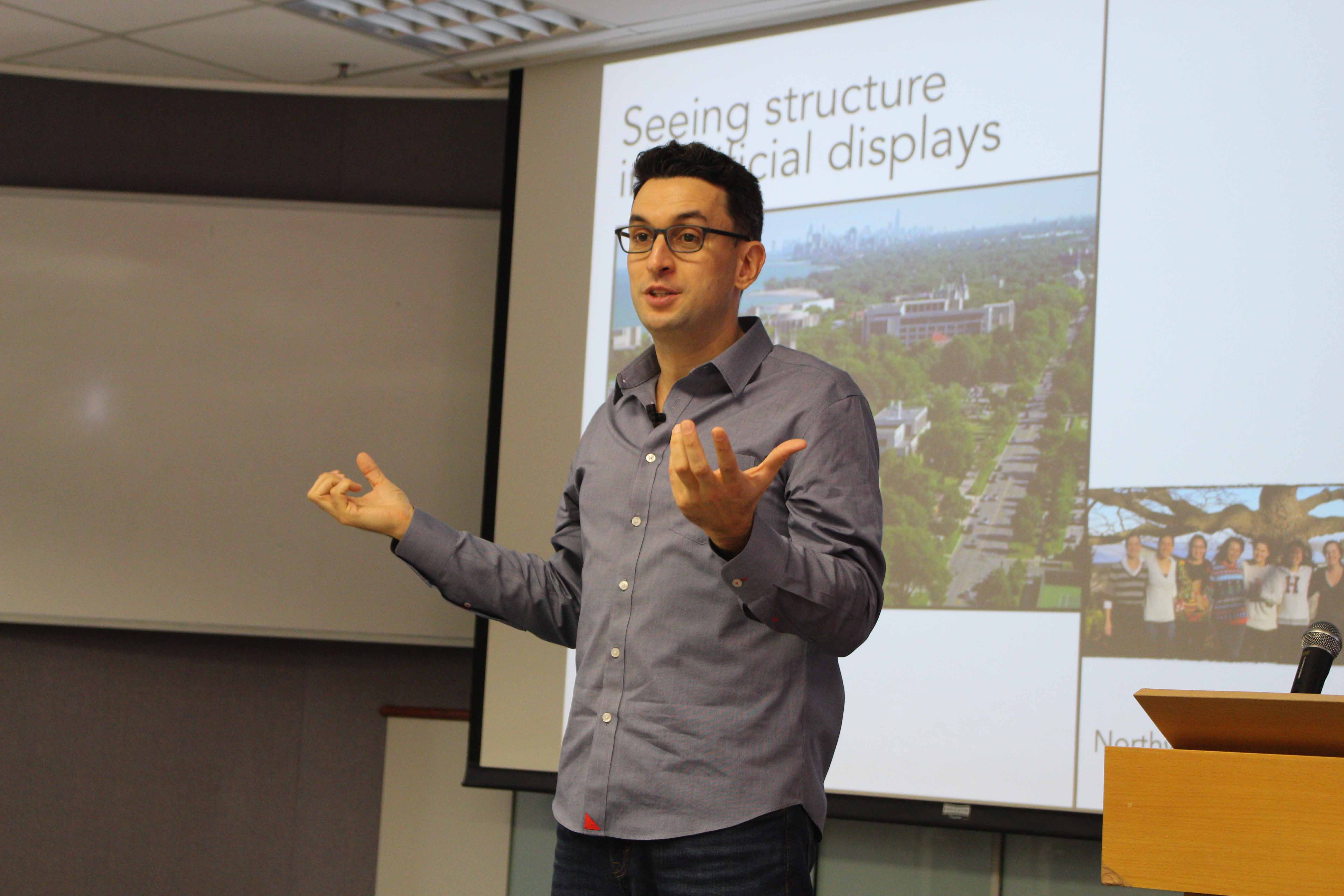
| Date: | November 13th, 2018 (Tuesday) |
| Time: | 11:00am -12:00nn |
| Venue: |
Room 619, Sino Building, Chung Chi College, CUHK |
| Speaker: |
Steven Franconeri, Ph.D.
Professor of Psychology |
| Affiliation: | Northwestern University |
| Title: |
Thinking with Visualizations, Fast and Slow |
|
Your visual system evolved and developed to process the scenes, faces, and objects of the natural world. You then adapt that same system to process the artificial worlds of graphs, diagrams, data visualizations. This adaptation can lead alternatively to fast and powerful – or deeply slow and inefficient – visual processing. I'll demonstrate these capacity limits using interactive visual tasks, especially those limits that arise when we extract structure and meaning from artificial displays. Understanding these constraints leads to guidelines for STEM pedagogy and display design, and opens new questions for basic research on visual thinking. |
|
| About the Speaker: |
Steven Franconeri is a Professor of Psychology at Northwestern, and Director of the Northwestern Cognitive Science Program. His research is on visual thinking, visual communication, and the psychology of data visualization. He directs the Visual Thinking Laboratory, where a team of researchers explore how leveraging the visual system - the largest single system in your brain - can help people think, remember, and communicate more efficiently. His undergraduate training was in computer science and cognitive science at Rutgers University, followed by a Ph.D. in Experimental Psychology from Harvard University, and postdoctoral research at the University of British Columbia. His work on both Cognitive Science and Data Visualization has been funded by the National Science Foundation, the Department of Education, and the Department of Defense. He has received a National Science Foundation CAREER award, a Psychonomic Society Early Career award, and a Cattell Sabbatical award for his research on visual thinking. |

| Date: | October 29th, 2018 (Monday) |
| Time: | 11:00am -12:00nn |
| Venue: |
LT2, Sino Building, Chung Chi College, CUHK |
| Speaker: |
Stefan R. SCHWEINBERGER, Ph.D. Full Professor and Chair |
| Affiliation: | Friedrich Schiller University, Jena, Germany |
| Title: |
Distinct ERP Correlates of Detection, Norm‐based Coding, and Identification in Face Perception |
|
The strengths of event‐related brain potentials (ERPs) include a millisecond time resolution window to neural processes underlying perception and recognition of complex stimuli under relatively natural viewing conditions. I will present both systematic research conducted over the past 25 years and current data which show how we can systematically link different ERP components to different functional processes that relate to face detection (N170), norm‐based coding (P200), and identification (N250). The research I present provides converging evidence for these links emerging from investigations with diverse paradigms, including own‐race and own‐age biases in face perception, effects of facial distinctiveness and photorealistic caricaturing, effects of parametric manipulations of distance‐to‐norm in faces and their corresponding anti‐faces, and effects of facial familiarity. While basic research is yet to exploit the full potential of ERPs to investigate multiple processes in face perception, I will show a few applied examples for how these components can be used as tools to probe different aspects of face perception that are induced experimentally, or that are subject to individual differences in face recognition abilities. |
|
| About the Speaker: |
Prof. Stefan SCHWEINBERGER obtained his undergraduate degree in Psychology in 1988 from Konstanz University, Germany and completed his PhD at the same institute in 1991. After some years as a post-doctoral fellow, he took up a Professor position at the University of Glasgow, UK in 2000 and moved to a Full Professor position at Friedrich-Schiller- University, Germany in 2005. There he has established a highly productive research unit for person perception that is funded by the German Research Foundation. Prof. Schweinberger has been on the editorial board of several journals including The Quarterly Journal of Experimental Psychology and Cortex. Since 2013, he is the editor-in-chief of The British Journal of Psychology. His research focus is on face and voice processing and concerns questions related to identity recognition and racial biases, among other topics. Prof. Schweinberger is a leading neuroscientist in the field of person perception. He has published over 160 peer-reviewed articles that have attracted over 8000 citations on Google Scholar. |
2017-2018 學年

| Date: | April 10, 2018 (Tue) |
| Time: | 11:00-12:00 |
| Venue: | UG04, Chen Kou Bun Building |
| Speaker: | Lei FENG, Ph.D. Research Assistant Professor, Department of Psychological Medicine, Yong Loo Lin School of Medicine |
| Affiliation: | National University of Singapore (NUS) |
| Title: |
Music as Medicine: Can singing together prevent cognitive decline in aging? |
| Cognitive function declines with advancing age and the prevalence and incidence of dementia rise dramatically in later life. Impaired cognitive function limits one’s ability to work, live and socialize, and represent a major obstacle for active and functional aging. How to maintain good cognitive health in the later stage of life is an important and challenging question that requires well‐founded research with good translational opportunities. In Singapore, we are currently working on a large randomized controlled trial that aims to assess the efficacy and underlying biological mechanisms of choral singing in the prevention of cognitive decline among at‐risk individuals living in the community (ClinicalTrials.gov Identifier: NCT02919748). In this talk, I will summarize status of dementia prevention in the world and in Singapore, and elaborate on the scientific rationales, study designs, outcome measures, recruitment status and short term and long term plans of the choral singing RCT. | |
| About the Speaker: |
Dr. Feng Lei is a Research Assistant Professor at the Department of Psychological Medicine, Yong Loo Lin School of Medicine, NUS. He received his medical and psychiatric trainings in Shandong, China and obtained his PhD from NUS in 2009. His primary research interest is the epidemiology and prevention of cognitive decline and dementia. He has over 100 research publications on aging, cognition, and mental health. He has successfully obtained research grants amounting to over three million Singapore dollars as the Principal Investigator. His recent awards include the NUHS Academic Medicine Development Award (2013), NUHS Clinician Scientist Program Award (2014) and the MOH Transition Award (2016). |
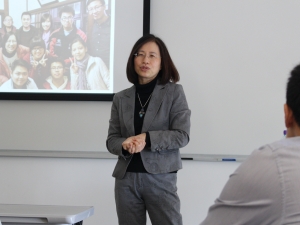
| Date: | January 16, 2018 (Tue) |
| Time: | 12:00-13:00 |
| Venue: | Rm 506, Wu Ho Man Yuen Building |
| Speaker: | Su-Ling Yeh, Ph.D. Distinguished Professor, Department of Psychology Conjunct Professor, Graduate Institute of Brain and Mind Sciences |
| Affiliation: | National Taiwan University, Taiwan |
| Title: |
Meaning survives visual crowding, but not semantic integration over time |
| Our visual environment is cluttered, especially during the reading process when each fixation is accompanied by words in the periphery that are crowded. We have shown previously that unrecognizable words due to visual crowding still generated robust semantic priming to the subsequent target (Yeh, He, and Cavanagh, 2012, Psychological Science). This result was further supported by ERP (N400 component) and fMRI (BOLD signal) experiments. Based on these findings, we further explored whether unrecognizable crowded words can be temporally integrated into a phrase. By showing one word at a time, we presented Chinese four-word idioms with either a congruent or incongruent ending word in order to examine whether the three preceding crowded words can be temporally integrated to form a semantic context so as to affect the processing of the ending word. Results from behavioral, ERP, and fMRI measures consistently showed congruency effect only in the isolated/un-crowded condition, but not the crowded condition, which does not seem to support the existence of unconscious multi-word integration. These convergent results suggest that while a single word under visual crowding can be processed unconsciously, multiple words require consciousness to temporally bind each word’s meaning together. Taken together, these results shed light on the function of consciousness in temporal semantic integration. | |
| About the Speaker: |
Professor Su-Ling Yeh is a distinguished professor in the Department of Psychology, National Taiwan University. She received her Ph.D. from UC Berkeley, and has been teaching at NTU afterwards. She was the recipient of academic awards of Ministry of Education and Ministry of Science and Technology. Her research interests include vision, attention, consciousness, multisensory perception, emotion, word recognition, aging, blue light effect, statistical regularity, and applied research on image processing and display technology. |
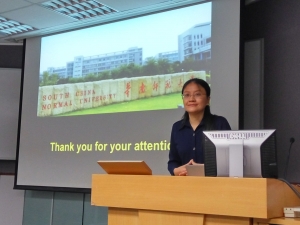
| Date: | January 9, 2018 (Tue) |
| Time: | 11:00-12:00 |
| Venue: | Rm 619, Sino Building |
| Speaker: | Suiping Wang, Ph.D. Professor, School of Psychology |
| Affiliation: | South China Normal University |
| Title: |
Semantic Retrieval and Integration during Sentence Reading: Evidence from Temporal and Spatial Dynamics |
| Ultimate goal of language comprehension is to understand meaning from the given information flow. In this talk, I will discuss two sets of our studies about lexical-semantic retrieval and semantic integration processes that are crucial to this goal. In the first set of studies, we used high temporal resolution techniques, such as eye tracking and ERP methodologies, to examine the very early stage of these two processes during Chinese sentence comprehension. We show that in contrast to previous findings that there is little evidence for a semantic parafoveal preview effect during the reading of alphabetic languages, high-level linguistic information can be obtained from preview processing and be integrated into the context very rapidly. Moreover, context exerts a significant effect in the semantic preview processing, suggesting that different levels of information processing are highly parallel and interacted during Chinese sentence reading. Next, I will discuss results from a set of imaging studies, including fMRI and EROS (event-related optical signal), to separate the cortical network of lexical-semantic retrieval and semantic integration in language processing, and to explore the temporal and spatial dynamics of these networks during sentence reading comprehension. | |
| About the Speaker: |
Suiping Wang, PhD, is a cognitive psychologist who has extensive experience on study both the temporal and spatial dimensions of language comprehension using multimodal behavior and imaging techniques, such as eye movement, ERPs, and fMRI. She earned her PhD in Psychology at South China Normal University in 2000. Her PhD thesis was awarded “National Top 100 Doctoral Dissertation” by Ministry of Education, P. R. China in 2002. For more than 15 years, she has been studying how the different aspects of language (lexical, semantic, syntactic, and pragmatic) contribute to the mental representation of sentence and discourse processing in the brain. She is also interested in the relationship between the cognitive mechanisms of language processing and those of other kinds information processing. She is the Principal Investigator on several projects that use multimodal imaging techniques to study both the temporal and spatial dimensions of cognition in the brain. More recently, she has been working on language project with special populations, including Autism Spectrum Disorder and individuals with cochlear implant. She has published in a wide range of international peer-reviewed journals, such as Cerebral Cortex, Neuroimage, Neuropsychologia, Language and Cognitive Processes, Quarterly Journal of Experimental Psychology, et al. She is now a Full Professor in the School of Psychology at South China Normal University, and Pearl River Distinguished Professor of Guangdong Province in China from 2011. |

| Date: | November 21, 2017 (Tue) |
| Time: | 11:00-12:00 |
| Venue: | Rm 619, Sino Building |
| Speaker: | Dr Cathy Fernandes, BSc PhD PGCAP Senior Lecturer in Preclinical Models of Neurodevelopmental Disorders at the Social, Genetic & Developmental Psychiatry (SGDP) Centre & Divisional Education Lead, Psychology and Systems Sciences Institute of Psychiatry, Psychology & Neuroscience (IoPPN), King's College London |
| Affiliation: | King's College London |
| Title: |
Understanding individual differences in psychiatry – genetics versus environmental influences |
| One of the oldest arguments in psychology is whether our behaviour is a product of inherited, genetic factors (nature) or due to acquired life experiences (nurture)? Exciting research is now focused on how genes shape our behaviour, and how nature and nurture contribute to the development of psychiatric disorders. In this seminar, I will give an overview of the most recent, world‐leading research in this field. I will also discuss the various opportunities to study this area of psychology at King’s College London in the UK, and what career opportunities are available after graduating. | |
| About the Speaker: |
Dr Cathy Fernandes originally trained as a psychopharmacologist at King’s College London working in the research field of anxiety and drug dependence. She currently heads the ‘Preclinical Models of Neurodevelopmental Disorders’ group at the SGDP Centre (Institute of Psychiatry, Psychology & Neuroscience, King’s College London) investigating the contribution of genetic and environmental mechanisms to a range of neurodevelopmental psychiatric disorders. In addition to studying the role of genes in behaviour, she also has a particular interest in the interaction of genes with early life stressful environments and drug exposure. |
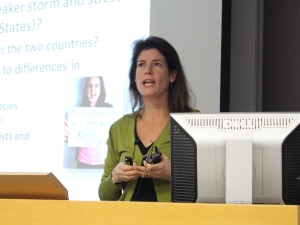
| Date: | November 7, 2017 (Tue) |
| Time: | 11:00-12:00 |
| Venue: | Rm 619, Sino Building |
| Speaker: | Eva Pomerantz, Ph.D. Professor of Psychology |
| Affiliation: | University of Illinois at Urbana‐Champaign |
| Title: |
The Social Construction of Adolescence: Insights from the United States and China |
| The research I will present focuses on the idea that how youth navigate adolescence is shaped in part by their views of teens, which often reflect cultural constructions of adolescence. The first set of studies I will discuss indicates that American and Chinese youth take different pathways (e.g., in terms of their engagement in school) through early adolescence. The second set of studies suggests that one reason for the different pathways is that culture influences youth’s conceptions of adolescence, with Western culture leading youth to see this phase more as a time of “storm and stress”. The third set of studies explores the role of youth’s views of teens in their development during adolescence in more depth, with attention to whether changing such views influences their behavior. | |
| About the Speaker: |
Eva Pomerantz received her PhD from the Department of Psychology at New York University. Since then, she has been a faculty member at the University of Illinois at Urbana-Champaign. Dr. Pomerantz’s research focuses on how to motivate youth in school to facilitate their learning, particularly as youth navigate adolescence. Although Dr. Pomerantz has spent much of her career studying this issue in the United States, she has also studied it in China where youth’s achievement is higher than that of their American counterparts. Dr. Pomerantz has published over 75 papers in scholarly journals and edited volumes. Her research has been featured in multiple media outlets as well. Dr. Pomerantz has been an Editorial Consultant for the journals Child Development and Developmental Psychology. She also served as an Associate Editor for the Journal of Personality and Social Psychology. She has also been a member of American grant reviewing panels (for example, at the National Science Foundation). |

| Date: | October 10, 2017 (Tue) |
| Time: | 11:00-12:00 |
| Venue: | Rm 619, Sino Building |
| Speaker: | Yiqun Gan, Ph.D. Professor |
| Affiliation: | School of Psychological and Cognitive Sciences Peking University |
| Title: |
Future Orientation: Temporal Correlates, Genetic Mechanisms, and their Implications for Health Behaviors and Depression |
| Future orientation refers to the extent to which an individual thinks about the future, anticipates future consequences, and plans before acting. In this presentation, we aim to broaden our understanding of future orientation in terms of four aspects: (1) We investigated the relationship between future orientation and time perception through three paradigms, namely experimental discounting, task prioritization, and the temporal Doppler effect. We found that future orientation involves underestimating future temporal distance and accurately perceiving the importance of future events. (2) We explored the role of future orientation in dietary behaviors and preventing air pollution, and identified planning as a key mediator in health behavioral change. (3) We found evidence for future orientation in buffering the kindling effect of depression and its emotional regulation function, using longitudinal and laboratory studies. Further, based on these findings, a low‐intensity intervention program, Positive Future Imagery Modification, was developed, and a randomized control trial study confirmed its effectiveness in treating mild depression. (4) We examined the interactions of the FKPB5/COMT Val158Met polymorphism and stress (early stressful life events, experimental prime) on the development and manifestation of future orientation. We demonstrated that the TT genotype in FKBP5 was associated with higher levels of future orientation in a positive environment, whereas the Met/Met genotype in COMT Val158Met was associated with higher levels of future orientation in more adverse conditions. | |
| About the Speaker: |
Yiqun Gan is a professor at School of Psychological and Cognitive Sciences, Peking University, China. She has received her Ph.D. in the Chinese University of Hong Kong in 1998. She has published over 90 research papers as the first or corresponding author, and her findings were published in the top international journals such as Journal of Personality and Health Psychology. She has been the PI of a number of research projects funded by the National Science Foundation of China. She was invited to a present as a Transversal Keynote Speaker at the International Congress of Applied Psychology in 2014, and to convene an Invited Symposium at the International Congress of Psychology in 2012 and at the International Congress of Applied Psychology in 2018. She currently serves as an Associate Editor for Journal of Pacific Rim Psychology and as an editorial board member for Applied Psychology: Health and Well-being and Stress and Health. Her research on future orientation and resilience has embraced numerous state-of-the-art techniques such as laboratory experiments, molecular genetics, physiological indexes, eye tracking, and ERP, which has placed her work on the cutting edge of the science. She has won the title of “Recognized Psychologist” by the Chinese Psychological Society in 2016, and was nominated as a fellow of the International Association of Applied Psychology in 2017. |

| Date: | October 9, 2017 (Monday) |
| Time: | 12:00-13:00 |
| Venue: | Rm 109, Chen Kou Bun Building |
| Speaker: | George Christopoulos, Ph.D. Assistant Professor, Nanyang Business School, NTU, Singapore Research Director, Culture Science Institute, NTU Fellow, Asian Consumers Insights Institute Principal Investigator, Future Resilient Systems, ETH Zurich Affiliated Scholar, VT Carilion Research Institute |
| Title: |
Applied Decision (Neuro)science: Culture, Beauty and Architecture |
| We challenge the theoretical and methodological boundaries of decision sciences by expanding to atypical research domains. The first set of studies will examine an omnipresent but understudied choice phenomenon: how people decide for other people (called “allocentric”)– as opposed to deciding for themselves (“egocentric”). Our results show that culture drastically determines allocentric decision mechanisms. The second part explains how seemingly irrelevant social judgments impact perception of (facial) beauty ‐ and vice versa. The third part will present preliminary data of a set of qualitative, experimental and longitudinal studies of human attitudes and responses towards architectural characteristics of indoor working spaces. Throughout the presentation, some (relatively new) methodological tools will also be presented. Overall, this research underlines the importance of context for elucidating decision‐making mechanisms. | |
| About the Speaker: |
George Christopoulos is a Decision Neuroscientist (University of Cambridge; postdoc at Cambridge, Baylor College of Medicine and Virginia Tech) with extensive research experience in neurobehavioral accounts of human behavior. He is Assistant Professor at Nanyang Business School, Nanyang Technological University, Singapore and Research Director of the Culture Science Institute. |

| Date: | September 22, 2017 (Fri) |
| Time: | 11:00-12:00 |
| Venue: | Rm 619, Sino Building |
| Speaker: | Weiwei Zhang, Ph.D. Assistant Professor |
| Affiliation: | University of California, Riverside |
| Title: |
The Effects of Prior Familiarity on Working Memory Representations and Processes |
| Prior stimulus familiarity can influence visual working memory (VWM) representations and processes in various ways based on some recent behavioral and Event‐Related Potential findings. First, VWM representations for familiar stimulus can be accessed faster than unfamiliar stimulus. Second, this speed advantage can also manifest to VWM consolidation in that familiar stimulus is encoded into VWM faster than unfamiliar stimulus. Third, faster VWM consolidation for familiar stimulus could in turn lead to increases in the amount of information retained in VWM when VWM consolidation is interrupted, but not when encoding time is sufficient. Consequently the presence and absence of the consolidation effect could potentially account for the mixed findings on the capacity effects of familiarity in the literature. These findings have illustrated various sources for the facilitation of working memory by familiarity and highlighted the pivotal roles of VWM processing in the interactions between prior knowledge and moment‐by‐moment memory processing. | |
| About the Speaker: |
Dr. Zhang received his Ph.D. in Experimental Psychology from the University of Iowa. He joined faculty at the Department of Psychology at University of California, Riverside in 2012. The research program in Dr. Zhang’s laboratory focuses on perception, memory, and higher cognition using multiple Cognitive Neuroscience methods, including eye tracking, EEG, non-invasive brain stimulation, and fMRI. |

| Date: | September 20, 2017 (Mon) |
| Time: | 12:00-13:00 |
| Venue: | Rm 619, Sino Building |
| Speaker: | Po‐Jang Hsieh, PhD. Assistant Professor |
| Affiliation: | Duke‐NUS Medical School, Singapore |
| Title: |
Causes, Consequences, and Neural Correlates of Visual Awareness |
| How conscious experience is realized in neuronal activity is one major unsolved problem in neuroscience. Brain scientists have focused on finding neural correlates of consciousness for over two decades. Here I go beyond this correlational paradigm and use multivariate pattern analysis to investigate the causal relationship between cortical activity and visual awareness. First, I examined the neural consequences of consciousness by asking whether the pattern of neural activity in visual cortex can be altered by a change in the interpretation of a constant visual input. Second, I examined the neural causes of consciousness by asking whether the contents of visual awareness during binocular rivalry can be biased/predicted by the neural activation pattern that immediately precedes binocular stimulus presentation. My results show that the pattern of neural activity in visual cortex not only reflects changes of subjects’ conscious interpretation of the stimulus, but also predicts subjects’ subsequent perceptual states during binocular rivalry. These findings go beyond mere correlates of consciousness to reveal candidates areas that are causally involved in realizing conscious experience. | |
| About the Speaker: |
Dr. Po-Jang (Brown) Hsieh received his Ph.D. in Cognitive Neuroscience from Dartmouth College, USA in 2008, and was a research scientist at MIT until 2011. He is now an assistant professor at Duke-NUS Medical School in Singapore. He is interested in understanding how the human brain is able to perceive and experience the world. He studies the human neural bases of perception, attention, and consciousness with EEG, functional brain imaging (fMRI), neural decoding methods, and psychophysical techniques. |
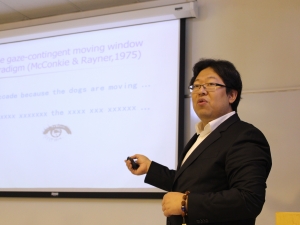
| Date: | September 18, 2017 (Mon) |
| Time: | 12:00-13:00 |
| Venue: | Rm 109, Chen Kou Bun Building |
| Speaker: | Ming Yan, PhD. Research Scientist |
| Affiliation: | University of Potsdam |
| Title: |
Eye Movements in Reading:Perceptual Span and Parafoveal Processing |
| It is well established that the number of times we look at words (and the durations associated with these fixations) are reliable and valid indicators of the orchestration of visual, attentional, languagerelated, memory‐related, and oculomotor processes which lead to the recognition of words and the comprehension of text. Importantly, reading involves effective extraction of information not only from currently fixated foveal words but also from upcoming parafoveal words. During a single fixation the effective field of vision is quite narrow. Comparisons across different writing systems and across different individuals will be presented, concluding that the perceptual span can be flexibly modulated by various factors. Reading also involves automatic activation of lexical representations from foveal and parafoveal words. Which aspects of these words (orthographic, phonological, morphological, semantic, etc.) become available at what time during processing is an area of much theoretical controversy. Much of the theoretical debate has been driven by languagecomparative research, especially between the reading of unspaced logographic scripts like Chinese and spaced alphabetic scripts like English or German. Studies on phonological and semantic processing of parafoveal words during the reading of English, Chinese, German and Korean sentences will be presented and discussed. In Chinese, very early semantic preview effects have been consistently demonstrated, whereas phonological preview may be less effective. These results are in nice agreement with the logographic nature of the Chinese writing system and provide support for eye‐movement models that adopt the guidance by attentional gradient assumption. | |
| About the Speaker: |
Dr. Yan received his Ph.D from the Beijing Normal University in 2008. He then works as a research scientist at the University of Potsdam, Germany. His research area is eye-movement control during reading, focusing on how reading varies across different writing systems (Simplified and Traditional Chinese, German, English, Uyghur, Finnish, Korean etc.) and across different individuals (normal adults, typically developing readers, second-language learners of Chinese, deaf readers and dyslexic readers). His main research topics include (a) the influence of high-level linguistic factors on saccade generation, (b) lexical processing from foveal and parafoveal words, (c) perceptual span in reading and (d) reading behaviors of unskilled readers and impaired readers. |

| Date: | September 5, 2017 (Tue) |
| Time: | 11:00-12:00 |
| Venue: | Rm 619, Sino Building |
| Speaker: | Edgar Bresó, PhD. Associate professor |
| Affiliation: | Universitat Jaume I de Castellon |
| Title: |
New Methodologies for Assessing Emotional Intelligence using Technologies |
| The main purpose of this talk is to test discuss about past and current methods for assessing Emotional Intelligence. Additionally, The statistical validity of the “Mobile Emotional Intelligence Test" (MEITPRO) will be showed. That is a test for assessing Emotional Intelligence using Smartphones and tablets. Regarding to tat last issue, data from more than 1,000 individuals from 4 different countries (Spain, United States, Germany, and Italy) were collected and analyzed for testing the reliability and validity of the scales (i.e., perception, understanding, and management of emotions). Additionally, several improvements were carried out in comparison with the classical papel‐pencil surveys for assessing EI (i.e., timeresponse control, dynamic pictures, etc.). Results showed acceptable values of reliability for this newly developed scale. Thus, this talk will highlight the reliability of a “Mobile survey” for assessing Emotional Intelligence. Implications for research and practice were discussed. | |
| About the Speaker: |
PhD. in work psychology and associate professor at Universitat Jaume I de Castellon. He is director of the “Emotionally Intelligent Organization” Research team and lecturer in subjects related to Emotions recognition, Emotional Intelligence and Communication. His areas of interests are mainly related to the assessment of Emotional Intelligence. On the other hand, he is also consultant in organizations for selection and assessment processes. He has participated in 13 research projects and currently is the head (principal researcher) of two projects about Emotional Intelligence and Well-being. He collaborated for a year in the “Health, Emotion and Behavior Laboratory” in Yale University (USA) by the supervision of Peter Salovey and Mark Brackett where he developed and applied programs for enhancing emotional competences among employees and leaders. Additionally, is the CEO of Emotional Apps (www.emotional-apps.com) a company that applies technology to transform the existing scientific knowledge into applications by providing solutions for companies and universities. In the last years, professor Bresó has published articles and papers in conferences regarding to Emotional perception and he is the author of the Mobile Emotional Intelligence Test (MEITPRO) that is a web application for assessing Emotional Intelligence using Computers, Smartphones and Tablets. |


